








for year ending 31 July 2023

Welcome to the 2022-23
Financial Statements
We are delighted to present the 2022-23 annual report and financial statements for Buckinghamshire New University (BNU).
2022-23 has been another highly successful year for the University and these statements report what we believe are the strongest results in our history.
Giving our students the best possible experience is our top priority and our staff work tirelessly to achieve this. We were therefore delighted that, in the National Student Survey 2023, BNU was ranked No 1 in England for overall student satisfaction /or positivity.
Similarly, BNU continued to lead the way for the postgraduate research student experience. In Advance HE’s Postgraduate Research Experience Survey (PRES) 2023, BNU was ranked 1st for the quality of supervision and many other aspects of the postgraduate research student experience.
Winning the Whatuni Student Choice Award for our response to the cost-of-living crisis was a wonderful tribute to the work we do to support our students. The award recognised the partnership of the University and Bucks Students’ Union in alleviating the cost-of-living pressures facing BNU students. This accolade was further endorsed when, in its inaugural Good University Guide, the Daily Mail declared BNU its University of the Year for Student Support.
Furthermore, the Higher Education Policy Institute profiled the University’s response to the cost-ofliving crisis, citing this as an example of sector best practice, which was highlighted in national broadcast and print media.
The University continues to demonstrate equally striking success in relation to our financial strength and sustainability. These statements report BNU’s fourth consecutive and highest ever surplus of £8.9m. At the same time the University has invested heavily in the student experience, modernising and expanding our estate, including a £20m+ programme of redevelopment at its High Wycombe campus.
2022-23 marked the beginning of the University’s work to implement our new Thrive 2028 strategy. This strategy reflects our four principal priorities: supporting students to succeed, delivering knowledge and skills, becoming an ever more fit and agile organisation, and supporting our places and partners. These statements report early progress in our work to meet ambitious targets in these areas of activity.
Already the University has made excellent progress in reforming its curricula, revising our full range of courses to improve the

Professor Nick Braisby Vice-Chancellor and Chief Executive
student experience, more deeply embed work experience in our programmes, and delineate the BNU’s distinctive approach to education for citizenship. We have also launched new strategies, aligned to Thrive 2028, for our people, for sustainability and for equality, diversity and inclusivity.
In June 2023, we were delighted to welcome Professor Damien Page to the University as Deputy ViceChancellor. Damien brings a wealth of experience and knowledge to BNU and has a significant track record of success in senior roles. He will play an integral role in leading the successful development and delivery of the University’s Thrive 2028 strategy.
Finally, we thank our staff, Council members and strategic partners for their continued support and our students and learners for choosing BNU and so wholeheartedly embracing all it has to offer. It is thanks to our University community’s hard work that we can all take collective pride in reporting the University’s excellent performance in 2022-23.

Maggie Galliers CBE Pro Chancellor and Chair of Council
As with the past three years of financial statements, the University is again reporting a very successful performance. The University believes that its financial results for 2022-23 are the strongest in the University’s history, and BNU has made progress against the strategic objectives set out in its exciting and ambitious new University strategy, Thrive 2028. The targets the University has set itself are outlined in section 4 of this report: Objectives and Strategies
That the success of the past four years has been achieved against the backdrop of the coronavirus pandemic; continuing uncertainty and challenge for the higher education sector; and the economic impact of rising inflationary pressures and the cost-ofliving crisis, is all the more reason why this report details the University’s relevant context and some key developments that have helped deliver strategic progress.
Since its foundation in 1891 as the School of Science and Art, Buckinghamshire New University’s mission has always been to transform lives through inspiring, employment and profession-focused education, enabling people to impact society and their future positively.
The University’s roots are intimately woven into the heritage of its communities and the industries they have supported. In the 20th century, the University developed strong links with local crafts like furnituremaking and cabinetry, design and manufacture. In 1999 it was awarded University College status and became known as Buckinghamshire Chilterns University College. In 2007, the University adopted its current name – Buckinghamshire New University. In 2009 BNU consolidated its various sites and in 2010 opened the innovative Gateway Building, a state of-the-art integrated learning complex which won a prestigious Royal Institute of British Architects (RIBA) award.
The University currently operates over five sites. Its principal campus is in the Buckinghamshire market town of High Wycombe, surrounded by the Chiltern Hills, much of it designated an area of outstanding natural beauty. It also operates three satellite campuses: Uxbridge in north-west London; and Aylesbury and Pinewood Studios, Buckinghamshire. It has three halls of residence in High Wycombe –Hughenden Park Student Village, Windsor House, and Brook Street – and is proud to own Missenden Abbey in Great Missenden, Buckinghamshire. This converted 12th Century abbey provides an exceptional conference, wedding and events venue hotel and conference facility and is the site of its new International Hotel and Hospitality School.
Today, the wider region in which the University operates is an engine of the UK economy. The locality covered by the Buckinghamshire Local Enterprise Partnership, for example, is the 5th strongest within the UK for competitiveness, reflecting the extent of business start-ups and the depth of the knowledge-based economy 1. However, London and the Thames Valley also contribute heavily to the economic strength of the region in which the University operates. The University’s work with business also reflects the region’s unique position as an attractive destination for inward investment, and as a potential hub of infrastructure spend and development reflecting the construction of HS2 and the East West rail link, but also its position within the golden triangle and its involvement with the Oxford to Cambridge Arc.
2021-22 was the final year of the University’s previous strategy, Impact 2022. The long-term vision for the University has now been carried forward with a new University Strategy, Thrive 2028. It is for BNU to be an innovative, teaching-oriented University, delivering sector-leading and lifechanging educational and employment outcomes for its students.
Thrive 2028 commits the University to make effective, substantial and lasting change in respect of each of four central pillars: its relationship with its customers, product base, people, and environment.
Across the four pillars are key themes on which the University will focus particular effort in the period of the strategy.
BNU will work to help all its people –students and staff – thrive in regard to their health and well-being, improving their satisfaction and fulfilment.
BNU will work to provide its people – students and staff – with digitally enabled ways of interacting and communicating, enabling them to thrive in their learning, studying and working.
Sustainability and carbon net-zero
BNU will work to meet all carbon net zero and nature-positive commitments, helping its environment and all whose life depends upon it to thrive.
BNU will work to the highest quality standards, helping its students to thrive in their studies, and so achieve excellent academic, experiential, and employment outcomes.
BNU will expand and grow its range of subjects, courses and academic expertise, ensuring always that the University’s subject- and knowledge base thrives, building resilience and enabling core growth.
BNU will work with its local and regional communities, and key community and civic organisations, helping them to thrive.
BNU will work to embed inclusivity throughout its organisation, ensuring
that all feel they fully belong to, and can thrive in, the BNU community
Section 4 of this strategic report details some of the core KPIs against which the University will measure its success in implementing the strategic objectives set in Thrive 2028.
This year has been beset by cost-ofliving pressures which have translated into real challenges for many of BNU’s students, and staff, as their income has not risen in line with increasing costs.
The University has introduced some significant short-term measures to ensure its student support keeps pace with this challenge, enabling its students to continue to follow their aspirations, achieve their educational goals, and move on with their chosen careers.
To do this, the University made the following commitments:
• To maintain the reduction in accommodation costs introduced during COVID
• To increase the cash value of all bursaries and scholarships by 10%, in line with inflation
• To ensure the University is a real living wage employer, ensuring that students employed by the University see additional increases in income
• To maintain its funding of the Big Deal, delivered by the Students’ Union, and ensure that students can access sport and social activities at no cost to themselves
• To distribute free meals, reducing the cost pressures on students
• To reduce the price of food charged through our catering outlets, ensuring students have access to good value, yet healthy, nutritious and attractive food options
• To keep our facilities open, including over the Christmas and New Year period, to provide warm and safe spaces for students.
Reduced all menu prices by 30% in all campus catering outlets, saving students an estimated £55k in 22/23.
Funded the Students’ Union to develop a free meal programme, with 7,204 free meals supplied to students in 22/23.
Adopted the Real Living Wage for students employed by the University and SU, boosting student earnings by £52k.
Continued to fund the Big Deal which saves students up to £200 per month on sport and recreational activities.
Increased all scholarships and bursaries by 10% to account for in ation.
Accommodation fee increases remain well below in ation.
Allocated £855k in support to 1,963 students in 22/23.
The value of the University’s cost-of-living response has been recognised by three different awards.
The annual WhatUni Student Choice Awards announced BNU as its winner in the cost-of-living category, beating off stiff competition from many other universities.
The Daily Mail, in its inaugural University guide, declared BNU as its University of the year for Student Support.
Finally, the Higher Education Policy Institute, in showcasing the best work within the sector supporting students through the cost-of-living crisis, chose BNU alongside the University of Manchester as their examples of best practice which has attracted significant media attention for the University, including coverage on Channel 4 News and ITN News.
Student numbers on programmes taught by and registered at BNU has hit a new high during 2022-23, peaking at 7,115 in October 2022 to achieve the Impact 2022 target of 7,000 fulltime equivalent (FTE) students. This includes the University’s apprenticeship learners, a mode of delivery which continues to strengthen and drive expansion in its provision.
Disruption to international recruitment has limited some opportunities to maintain the expansion that has been
observed in three successive years, but the University has been extending its portfolio with a new BSc (Hons) in Physiotherapy recruiting to capacity in 2022-23, and the Missenden Abbey International Hotel School launching a new suite of courses in September 2023. New Masters courses in Nursing have proved extremely popular and, despite adverse political conditions for some apprenticeship programmes, the University has continued to expand this area of provision.
The University also successfully gained approval for the first Higher Technical Qualification courses, Nursing Associate and Sports Coach, which will run from September 2024 and further diversify the range of qualifications on offer to learners at BNU. A further eight programmes are already in the pipeline for the 2023-24 academic year.
The University has long-operated with a significant element of franchise provision, wherein University educational programmes are taught at partner colleges and institutions that meet our stringent quality standards. The University continues to grow its taught student numbers according to the aims of its Thrive 2028 strategy and these peaked at 7,729 during 202223 with students at partner colleges peaking at 14,654.
The University's international profile has reduced from its 2022 peak to stand at 9%, a figure that is low in comparison to the sector, but nevertheless representing growth relative to
Positive attainment gap of 8.1pp avg. for students with disabilities (1 of only 6 HEIs in UK)
BNU's population of just 5% in 2021; students from Europe now make up just 3% of the University's population compared to 7% a year earlier. Applicants are diverse, with 49% of fulltime undergraduate applicants coming from white backgrounds, 14% Asian and 21% Black.
The University’s student body reflects this diversity of applicants. As with many other higher education institutions, most of its students are female (63%; 37% male). They are ethnically diverse, 50% being white, 20% Asian, and 21% Black. 72% of students begin their study as mature students, whilst 28% are aged 21 years or less.
47% of BNU students are first in their families to attend university; 37% live in areas with low participation to university; and 40% live in areas of high deprivation.
Over the past four years 76% of providers reported a negative awarding gap affecting their students with disabilities. BNU is proud that, over this four-year period, the additional support it has provided its students with reported disabilities has resulted in a positive attainment gap of 8.1pp on average. Only six other providers have such a positive record in this regard.
This section outlines key developments in the past year in helping ensure the University delivers against the strategic objectives of its new University Strategy, Thrive 2028.
In 2022-23, the University began the work of creating two new academic Schools to help meet its ambitious growth targets.
Drawing on its ownership of the unique Missenden Abbey hotel and conference facility, the University has invested in the creation of the Missenden Abbey International Hotel and Hospitality School. The School is designed to meet the future needs of the hospitality industry, filling a gap in UK provision, and ensuring students obtain a firstclass education combined with practical, hands-on experience within the industry. Under the leadership of the new Head of School, the academic team has developed high-quality undergraduate programmes in Hotel Management and International Hotel Management and postgraduate programmes in Hospitality Leadership. Combined with other new programmes and growth in student numbers, by the time Thrive 2028 completes BNU expects the School to be at full strength and a key part of the delivery of the University’s growth target.
This year the University has also started work to create a new School of Engineering and the Built Environment. In part, this work has been funded by the generous award of £5.8m capital funding from the OfS, to support the creation of new, state-of-the-art teaching facilities to underpin education within engineering and the built environment, as well as within health and social care. This School will build on the University’s existing undergraduate programmes in engineering and architectural technology and the apprenticeship postgraduate engineer programme and help meet a key skills gap identified within the region. The University expects the School to be reaching full strength by the time Thrive 2028 completes and is another key element of the University’s strategy to meet its ambitious growth target.
Thrive 2028 also set a very ambitious target for student satisfaction. The principal target for BNU is to become the No. 1 ranked University in the UK as measured by average satisfaction or positivity in the National Student Survey. Despite the challenge in achieving this target, BNU has already come very close. Considering responses from its taught or registered population of students, the University was ranked 2nd in the UK and 1st in England among larger, non-specialist universities. The Thrive 28 University strategy sets out the aim to rank 1st in the 2027-28 academic year.
Such an impressive performance across all questions in the survey, results from a consistently large number of top 10 and top 5 rankings for individual themes within the survey:
Top 5 in the UK for Teaching on my course; Learning Opportunities; Assessment and Feedback; Student Voice; and Students’ Union
Even when restricted just to the University’s taught population, students taught only at BNU and not studying BNU degrees at partner colleges, then the University also achieves impressive rankings:
Top 5 for Teaching on my course; Learning Opportunities; Assessment and Feedback
Top 10 for Student Voice; and No. 1 in the UK for Students’ Union
In Advance HE’s Postgraduate Research Experience Survey (PRES) 2023, BNU was ranked 1st for the quality of supervision and many other aspects of the postgraduate research student experience.
The University was proud to see BNU rank 1st for a new question in the National Student Survey in which 91% of registered students agreed that during their studies they were free to express their ideas, opinions and beliefs. This
question was only asked for providers in England.
BNU has maintained its top ten position for overall student satisfaction and first for student supervision in Advance HE’s Postgraduate Research Experience Student survey (PRES) for the last two consecutive years. Furthermore, the institution achieved the top position in the latest 2023 poll for research culture (73%), community (73%), and responsibility (91%).
This year, the University made significant progress in developing its estate in line with Thrive 2028. The programme, which will see the University invest £20.1m in new facilities at its High Wycombe campus, will create a new centre for the campus, ensuring that students are at the heart of the University, physically as well as functionally. The programme involves creating a three-storey Atrium to accommodate receptions, shows, and graduation ceremonies, as well as provide a mix of different individual and social learning spaces. Technical workshops, supporting programmes in art, craft and design, have already been repurposed and redeveloped at a cost of £1.9m to provide new, state-of-theart facilities. A new student hub will offer a first line of support and advice for all student queries and a brand-new professional kitchen and restaurant will offer high-quality, nutritious and value for money food and beverages. Sitting on top of the atrium, will be a new roof garden, providing additional green and open space for students and staff. Completing the project is a new winter garden, reclaiming space previously given over to car parking for the benefit of BNU’s students and staff, a larger and more modern reception, and which itself will be framed within a new striking portal, welcoming visitors to its campus.
The design principles behind the project include the creation of permeable spaces, creating better connections between existing spaces and facilitating better connections amongst its people, the creation of beautiful communal and private areas which reflect the critical importance the University attaches to the University’s core prime purpose of promoting and enhancing
learning, and also creating spaces with abundant natural light, greenery, with better thermal efficiency and a much lower associated carbon emission. It is intended that the project will be complete in the autumn of 2023. More information about the University’s commitment to sustainability is included in the Public Benefit Statement section of this report.
Alongside this flagship estates project, the University has continued to invest heavily in other student-facing facilities at the High Wycombe campus. These include a new Garden Café, within the campus’s Gateway Building, which opens onto a newly designed and planted garden created as a memorial to the late Queen Elizabeth II. Meanwhile, the University has continued to create new teaching facilities to serve its growing health and social care provision and the University’s new School of Engineering and the Built Environment.
In 2022-23, the University completed the development of the 3rd floor of its Aylesbury campus to create state-ofthe-art teaching facilities for healthcare courses including an immersive virtual reality room which allows for interactive screen engagement with patient scenarios and data. With increasing demand for space to facilitate teaching in health and social care, this space has been redeveloped with £2.5m of capital funding from the Office for Students. The funding will provide a step change in the technological base of the University’s learning and teaching of nursing, midwifery and paramedicine, advancing students’ skillsets and enhancing graduates’ employability. It will enable the University to create a Centre of Excellence for Digital Health, working with its NHS Trust partners and the BNU Health and Social Care Academy.
The University’s Institute for Health and Social Care worked in partnership with the Buckinghamshire Health and Social Care Academy to launch the Buckinghamshire Community Wellbeing Hub at its Aylesbury campus in June 2023, with funding secured from NHS England. The Hub provides a collaborative space for health and social care professionals, charities and voluntary organisations to boost the
health and wellbeing of citizens. It will also support the University’s students’ mental health and provide them with opportunities to develop skills and experience through volunteering, placements, job shadowing and training.
In May 2023, BNU announced that it would be taking over the lease of High Wycombe’s Brunel Engine Shed. The iconic building outside the railway station in High Wycombe had been derelict and dilapidated for many years until the former Wycombe District Council stepped in and bought the historic Grade II listed structure to breathe new life into the building and the surrounding area.
The University’s plans for the Brunel Engine Shed include using it as a café and gallery space which will be open to the public, as well as providing workspace for entrepreneurs and start-up businesses spinning out of the University. BNU will be working in partnership with the Council to bring this wonderful building back to life and provide the local community with a new space to meet, showcase art and culture, and support businesses to promote economic growth.
This year has seen the launch of four Impact Centres: Centre for Advancement of Learning; Centre for Enhancement of the Environment and Innovation; Centre for Enrichment of Culture and Identity; and Centre for Improvement of Health and Wellbeing.
In line with Thrive 2028, these Centres will support research and innovation that impacts and enhances lives and society and underpins the University’s educational offer. This year, the Centres have supported and funded a total of 18 projects. Notable projects include the use of innovative technologies to enhance learning and education initiatives within the NHS as well as research investigating the impact of sustainable tourism expansion in developing regions or countries.
In addition to this, two Knowledge Transfer Partnerships (KTPs) are now fully operational. KTP Associates started in Spring 2023 and are working with Oasis Partnerships, a local charity
known for its work providing substance misuse expertise and support and Serious Brands, a Buckinghamshirebased company in a project designed to assist those living with challenging life conditions.
In September 2022, the University announced that it had joined the University Mental Health Charter programme. The vision of the Charter is for all UK universities to adopt and promote an inclusive approach to mental health, and to safeguard the wellbeing of their staff and students. The University believes that by embracing the charter and embedding its principles, the University will establish and maintain sector-leading performance for the mental health and wellbeing of staff and students; student recruitment, retention, satisfaction, progression, attainment, and employability rates; and higher creativity among staff. The Thrive 28 strategy expresses a clear commitment towards measuring, protecting and improving the health and wellbeing of its University community.
As a civic university, BNU prides itself on making a difference to the social and economic wellbeing of its communities through teaching, research, engagement, events and activities. In 2022-23, the University worked closely with several key partners to improve the health, social inclusion and sustainability of groups who are facing disadvantage.
2.6.1
BNU became the first university to create and adopt its own definition of Islamophobia. Research by the University of Birmingham revealed the shocking pervasiveness of negative attitudes to Muslims among the British public. BNU recognised the complex nature of defining Islamophobia, so worked with the Muslim community and consulted with experts, to understand how best to define and challenge it, while also considering the context of education and existing definitions of Islamophobia. This work was presented at Advance HE’s Equality, Diversity and Inclusion conference in March 2023.
“A fear, prejudice, hostility or hatred of Muslims or non-Muslim individuals that transcends into religious or racial discrimination or intolerance, by excluding or impairing the recognition, enjoyment or exercise, of equal human rights and fundamental freedoms in the political, economic, social, cultural, educational or any other areas of public life, both in the online and offline world”
The definition includes a non-exhaustive list of examples of Islamophobia in public life, the media, schools, the workplace, and in the religious sphere. You can read these on BNU’s website.
BNU’s Saturday Arts Club for 13-16-year-olds provides a programme of creative activities to support 30 young people each year to develop their interests and potential, as well as the confidence to engage in opportunities that can shape their future career paths. Aligning with its institutional values, BNU aims to make the programme as inclusive and diverse as possible, providing as many opportunities as possible to the broadest local population. Participants develop transferrable skills that can be applied in the creative sector and other career pathways alongside developing their passions for the arts. The demographic make-up comprises pupils from local schools BNU works with during the University’s outreach activities with 85% joining the Saturday Arts Club from a widening participation background in 2022-23.
2.6.3
BNU has partnered with local African and Caribbean heritage charity St Vincent and the 2nd Generation (SV2G), based in High Wycombe, to help address racial inequality and to improve the lives of ethnic minority communities. The collaboration aims to facilitate and enhance social and cultural exchanges; drive research to improve the experiences of African Caribbean communities in Buckinghamshire; and provide local and international skills development. Both organisations will support each other in improving race equality in Buckinghamshire and beyond. Their first two events together
marked Windrush 75 with daytime workshops for local school children and an evening celebration for the Windrush Generation and local stakeholders.
2.6.4
The Team Margot Foundation was set up to help save and improve lives by educating, inspiring and motivating people, especially from ethnically diverse communities, to register as blood, organ, stem cell and bone marrow donors, and to provide a range of support to families caring for child cancer patients. In 2022-23, BNU’s Institute for Health and Social Care began working with the Foundation, which also provides secretariat support to the APPG for Ethnicity Transplantation and Transfusion, to better understand the level of cultural competency in healthcare and to identify ways of improving it.
The University has continued to work closely with Bucks Culture, with the University’s Vice-Chancellor and Head of the School of Art, Design and Performance sitting on the Board of Trustees with stakeholders representing the artistic and cultural life of the county. The University hosts this group on its High Wycombe campus and providers in-kind support as part of the University’s investment in its places and partners. University students are regularly involved in Bucks Culture activities.
In 2022, BNU proudly announced that it had signed the Nature Positive Universities Pledge. This scheme is closely aligned with its aims and ambitions under the UN Sustainable Development Goals, and the University is delighted to be recorded among the scheme’s founding members. The scheme will see the University undertake a formal biodiversity assessment of its portfolio and use the data it acquires to develop SMART targets for improvement. BNU will report progress in November 2023. During the year, the University launched its new Sustainability Strategy and was highly commended in the Green Gown Awards which recognise the exceptional sustainability initiatives being undertaken
by universities and colleges across the world. The University was recognised for the Bucks New Usage initiative where unwanted items are collected from halls of residences and given a new lease of life to students who may need them. In 2022-23, BNU carried out decarbonisation audits of all its buildings to inform the Decarbonisation Plan which will launch in 2023-24.
The University’s overall performance in national league tables this year remains broadly consistent with previous years with rises in some areas counterbalancing falls in others. The strategic intent to improve the University’s league table performance remains and this year’s results underpin the continued focus on driving up educational outcomes to improve BNU’s rankings.
BNU maintained its top 80 position in the Guardian University Guide 2024 (based on 2022-23 data) consolidating its recent dramatic rises, despite BNU’s excellent 2023 NSS results not being taken into account. The Guardian would usually aggregate NSS performance for the previous two academic years although the introduction of new NSS questions in 2023 prevented comparative analysis with 2021-22 data.
BNU is ranked in the top 80 of all UK universities for the third consecutive year, and saw a strong performance at subject level ranking 3rd for Fine Art; maintaining its top 10 positions for Graphic Design (3rd) and Fashion (9th); and ranking 10th for Film Production & Technology which is testament to the strength of its programmes delivered at Pinewood Studios. Mental Health (3rd) and general nursing (14th) courses maintained strong positions in the top 15, and Social Work ranking 17th in the UK. Out of 120 universities with data from 2022, BNU ranked 9th for student satisfaction with assessment and feedback and 25th for satisfaction with teaching. BNU also ranked 4th out of 118 providers for its rate of expenditure per student.
Despite a seven-place fall in its overall ranking, BNU scored extremely well on student satisfaction, rising 24 places to rank 13th in the UK. BNU also performed strongly in relation to investment: its spend on academic services and facilities placed BNU at 23rd and 27th respectively for the UK illustrating its commitment to resourcing future growth, which underpins the Thrive 28 strategy.
Courses ranking in the UK’s top 40 for student satisfaction included Counselling, Psychotherapy & Occupational Therapy (1st); Drama, Dance & Cinematics (4th); Marketing (7th); Art & Design (5th); Sports Science (12th) and Nursing (13th).
BNU remained in the top 10 for teaching quality and top 20 for student experience, however, its overall ranking has disappointingly fallen from 121st to 127th. The University is very proud that BNU performs well across measures of social inclusion and remains in the top 20, rising two places to 15th in the UK and takes the top spot in the SouthEast. BNU also secured the rank of 4th best overall for its Black awarding gap, which has fallen again to -3%, and the University remains determined to remove this as soon as possible.
In April, Buckinghamshire New University scooped a prestigious and coveted award for its response to the cost-of-living crisis at the 2023 Whatuni Student Choice Awards (WUSCA), the leading higher education awards based solely on student choice.
BNU’s excellent work in other areas was also recognised, ranking 5th for Students’ Union, 9th for International and 10th for Student Support. The University also came 11th overall for Lecturers and Teaching Quality, and 15th for Career Prospects.
Buckinghamshire New University was named as University of the Year for Student Support in the Daily Mail University Guide, the first new university guide in Britain in the past 15 years. BNU also ranked 5th in UK and 1st in London & South-East for teaching excellence; 3rd in London & South East and 19th in UK for student experience; and in the top quartile in the UK (31st) for graduate salaries.
The Daily Mail University Guide featured a new ranking for British universities, combining several aspects of university performance. It included data on graduate destinations from the Higher Education Statistics Agency, outcomes from the National Student Survey, results from the 2021 Research Excellence Framework, and performance on student retention.
Alastair McCall, Editor, Daily Mail University Guide, said that student support runs through BNU ‘like a stick of rock’ and the University was the ‘standout candidate’ for the Daily Mail University of the Year for Student Support award.

13th for student satisfaction (up 24 places)
Top 20 for
• Counselling, Psychology and Occupational
• Therapy (1st),
• Drama, Dance and Cinematics (4th)
• Marketing (7th)
• Art & Design (5th)
• Sports Science (12th)
• Nursing (13th)
Award winner for cost-of-living response
• 5th best Students’ Union
• 9th best for International
• 10th for student support
Retained top 80 position for third consecutive year
• 4th for expenditure per student
• 9th for satisfaction with assessment and feedback
Top 10 for
• Fine Art (3rd)
• Graphic Design (3rd)
• Fashion (9th)
• Film Production and Technology (10th)
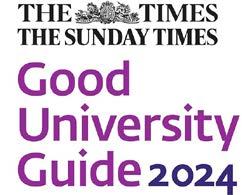
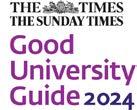
Top 10 for teaching quality
• Top 20 for student experience
• Top 20 for social inclusion and 1st in South-East
• 4th best Black awarding gap
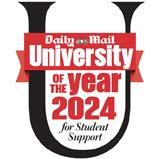
University of the Year for Student Support
• 1st in London and South-East and 5th in UK for teaching excellence
• 3rd in London and South-East and 19th in UK for student experience
The University operates in a competitive national and international market attracting students and staff from across the region, the United Kingdom and around the world to study and work at one of its campuses. BNU is an autonomous institution and determines its own mission and strategy, although as a supplier of publicly funded higher education, the University is subject to regulation and legislation to ensure that it acts responsibly in its use of public funds.
The University is an exempt charity within the meaning of Schedule 3 of the Charities Act 2011. The Higher Education and Research Act of 2017 (HERA) established the Office for Students (OfS) as the principal regulator of the University as a charitable institution.
The OfS’s primary aim is to ensure that English higher education is delivering positive outcomes for students – past, present, and future – and to ensure that students, from all backgrounds (particularly the most disadvantaged), can access, succeed in, and progress from higher education. The OfS focuses on delivering four primary regulatory
objectives, that all students, from all backgrounds, and with the ability and desire to undertake higher education:
• are supported to access, succeed in, and progress from, higher education;
• receive a high-quality academic experience, and their interests are protected while they study or in the event of provider, campus or course closure;
• are able to progress into employment or further study, and their qualifications hold their value over time; and
• receive value for money.
The University has a highly diverse mix of students, with regulated limits to fees for UK and undergraduate students. There is flexibility to set fee levels for postgraduate and EU and international students.
All universities which charge fees for home undergraduate students above £6,165 a year (up to the limit of £9,250) are required to submit an Access and Participation Plan (APP) to the OfS. The University’s annual APP was approved at the time of registration and a five-

year plan was approved by the OfS in September 2019 which runs until 2024-25. The plan commented positively on the University’s record in opening up higher education to all that can benefit. Its progress towards meeting targets since approval of the plan contains many highlights, including the fact that the University has no attainment gap for disabled students (indeed they achieve a higher rate of good honours), the fact that its black awarding gap has been steadily falling to stand now at around two thirds the size of the gap seen across the sector, and that its overall BAME awarding gap is half what it was five years ago.
The regulatory environment continues to evolve, and the University has taken steps to ensure its compliance with OfS requirements by consolidating responsibility for University compliance oversight into the role of University Secretary and Clerk to the Council.



Having accomplished all of its KPI goals for the Impact 2022 strategy, with the exception of a demanding target for improved graduate outcomes, the University adopted its Thrive 2028 strategy during 2022-23.
The University consulted widely in the development of the strategy, reaching out to all its key stakeholders for their views and insight to produce a strategy that builds on the success of Impact 2022 to increase ambition, over an extended strategy period. The operationalisation of the new strategy has been supported by the development of a new suite of KPIs and the development of a goal map that cascades the strategic objectives to an actionable level.
There are four pillars to support Thrive 28: Supporting its students to succeed, delivering knowledge and skills, becoming a fit and agile organisation and supporting its places and partners.
Three KPIs measure progress against the objectives of this pillar. For student satisfaction the target was to be the best in the sector and the latest results from the new 2023 survey
show that BNU remains very close to achieving this. For full-time, firstdegree respondents registered at BNU, averaged across all subjects and all questions, BNU ranks 2nd in the UK.
Graduates from BNU are increasingly likely to get their careers off to a positive start, with the proportion of students on BNU courses who reported a positive graduate outcome 15 months after their graduation exceeding 80% for the first time. BNU’s target for this metric includes students on courses delivered by partners and against this target of 76% the latest figure is 68.5%.
Continuation rates are within three percentage points of the University’s Thrive 2028 target but the sector has seen a post-pandemic decline that has halted progress towards the goal of 84.3%, which was set with reference to sector benchmarks from a year earlier.
Delivering knowledge and skills
Growth is crucial to the University’s Thrive 2028 objectives and the University has adopted a challenging target of reaching 10,000 student FTE by the end of 2028. From a base of just under 6,500 FTE in January 2023, this is growth of more than 50% and recruitment activities that took place
in 2022-23 have yielded positive results with an excess of 100 additional UCAS acceptances, the launch of a new School and subject area, and the redesign of an attractive new curriculum.
Becoming a fit and agile organisation
The University’s financial performance is strong and this is emphasised by an annual surplus of 9.4%, which sits within the target range of 5%-10%. Liquidity days of 223 is beyond the target of 175 days. The University has set itself a target of 80% staff advocacy which is a challenging but important objective from a starting point of 49% in 2023.
Supporting places and partners
The University has seen success in sector publications of universities’ performance in 2022-23, which will act to instil public confidence. The positive result in the TEF is complemented by consolidation of the University’s top 80 position in the Guardian and the Daily Mail naming BNU as its University of the Year for Student Support. As the University’s sector leading NSS results of 2023 have not been used, ranking positions in the Sunday Times.


The University has been transforming lives for more than 130 years, from developing its students’ full potential to making a positive impact to the environment and in its communities.
This financial year saw the strategic transition from the Impact 2022 to Thrive 2028 organisational strategies with the latter building on the former’s commitment to corporate social responsibility in the guise of a designated strategic pillar – Supporting Places and Partners. To be successful, the University must establish its relevance and instil public confidence.
BNU was the first university in the UK to achieve Gold CSR Accreditation twice, with its commitment described by the awarding body as ‘a visible testimony of excellence’ in CSR.
Being a responsible civic university is important to us and in this strategic period, the University will:
• deliver against its mission as a civic University, engaging with communities in Buckinghamshire and elsewhere to help create a civic engagement strategy that enables positive action for their benefit;
• engage effectively with industry and employers, actively contributing to local and national strategies, and economic growth within the region, helping to ensure its education programmes prosper as a result; and
• minimise the environmental impact of its estate by setting new targets to meet the highest standards around energy, waste and travel.
The most direct beneficiaries of its impact are its highly diverse community of undergraduate and postgraduate students who choose BNU for sectorleading and life changing education, designed to deliver excellent employment outcomes.
BNU provides an education that works for all regardless of background or circumstance, and provides skills for life, to meet the global challenges of the 21st century. In 2023, the University
was delighted that the Whatuni Student Choice Awards 2023 chose BNU as its winner in the category of cost of living, this recognition being testament to the diligence, creativity and commitment of those who work in its student support services teams. This achievement was reinforced by also winning the Daily Mail’s inaugural University of the Year for Student Support as the “standout candidate” amongst all UK universities.
In the Sunday Times Good University Guide 2024, published in September 2023 based partly on data relating to the 2022-23 financial year, BNU rose two places to rank 15th in England for social inclusion and 1st in the South East (excluding London). The University also ranked 4th for the lowest Black achievement gap, improving from 11th nationally last year– BNU is 1st in the South East and among post-92 institutions. BNU was also shortlisted for the outstanding contribution to Equality, Diversity and Inclusion in the Times Higher Education Awards 2023, recognised for launching its first Equality Strategy, becoming the first university to develop and adopt a definition for Islamophobia, and moving its family friendly package from bottom of sector to upper quartile, including introducing paid neonatal leave before it became a statutory requirement and extending benefits for parents to 18 weeks’ full pay.
BNU is driven in all that it does to support its students and learners to succeed, irrespective of the wider funding challenges higher education institutions face, underpinning its mission to widen participation through the transformative education it provides.
BNU supports tens of thousands of regional jobs with its beneficial impact estimated to be in the region of £1bn annually, reflecting the economic activity of the University’s students, staff, and alumni. BNU students work in and support many key local industries, including the vitally important health and social care sector, and are active contributors to local and regional charities and voluntary groups.
A report published by the Higher Education Policy Institute in September 2021 showed that international students delivered a net economic benefit of £25.9 billion to the UK in 2018-19, with significant contributions across the constituencies in which BNU’s campuses are based:
• Uxbridge and South Ruislip: £129.4m
• High Wycombe: £45.6m
• Aylesbury: £20.1m
Throughout the year, the University community worked tirelessly to continue its long-held commitment to make a positive contribution and impact through its business activity across several key areas, which are outlined in the pages that follow:
• Research, enterprise and regeneration activities
• Teaching impact
• Sustainability
• Community engagement
• Outreach and widening participation activities
• External engagement

Research and enterprise activities are central to BNU’s mission to make a positive difference to industry and society. Not only do they enhance teaching and learning, they are also a crucial part of the services that the University provides to the world around it. Research establishes new knowledge which extends the frontiers of human understanding and informs and shapes scholarly debate.
The University’s research spans across a wide range of fields and encompasses all its academic Schools. BNU has nearly 40 postgraduate students and has been ranked in the top ten for postgraduate student satisfaction and first for student supervision for the last two consecutive years (Advance HE's Postgraduate Research Experience Survey (PRES) 2022 & 2023).
During this financial year, the University’ recognised research income totalled £308k, and it has been awarded a further five new research projects. Its research projects are funded through a range of external providers, such as Health Education England and UK charities. During the past 12 months, researchers at BNU have published more than 90 peer reviewed articles and attended more than 40 conferences across the globe.
BNU’s forward-thinking approach regarding the use of agile methodologies in virtual education has led to the creation of a teaching guide, designed to redefine online education and build a new paradigm that is inherently virtual.
Professor Sri-Kartini Leet was appointed as commissioned artist for a communitybased project for Amersham Museum, co-funded by Arts Council England and The Rothschild Foundation and part of a three-year partnership between Essex Cultural Diversity Project and Farnham Maltings.
BNU’s commitment to innovation is exemplified through the development of cutting-edge course curriculum and learning materials focused on Cloud Computing and the Internet of Things. This project facilitated the creation of dynamic and industryrelevant content and positioned BNU to capture emerging opportunities in the ever-evolving landscape of technology education and strengthen its competitive edge.
This collaborative project involving five countries, and supported by Erasmus + and the European Commission, is a visionary initiative to foster knowledge and skills among academic teachers in the dynamic landscape of multicultural education. The revolutionary approach in academic operations s, enhances research culture by seamlessly integrating international students with their diverse knowledge and experiences, thereby enriching the social fabric of the University community, ensuring that all members thrive in a truly multicultural environment. The UniCulture Project exemplified BNU’s commitment to cultivating a vibrant and inclusive educational ecosystem.
Led by Plymouth University and in partnership with BNU and Canterbury University, this project was established to determine how the structure and content of pre-registration educational programmes influence the ‘readiness for practice’ of newly qualified children’s nurses. The project team consists of nurse academics, health policy leads,
practice leaders and key stakeholders responsible for the preparation, regulation, and quality assurance of children’s nurses in the United Kingdom.
PARADOX: Innovative training approach in the technology-assisted environment for water management.
PARADOX's primary objectives include bolstering tertiary water education capacities, fostering interdisciplinary curricula development, and creating climate change education materials in alignment with the International Hydrology Programme. The project aimed to enhance the skills of youth employees in conventional industries, thereby enhancing the competitiveness of the EU climate security sector. The project specifically focused on environmental concerns and the adoption of Industry 4.0 technologies to provide long-lasting benefits.
This project is a partnership between BNU and the Chilterns Conservation Board and is funded by the National Heritage Lottery, bringing together organisations in Buckinghamshire to uncover new knowledge about the lives of the men, women and children who depended on making things at home, or in village workshops and factories in the nineteenth and early twentieth centuries.
The University used Research England’s Policy Support Fund in part to fund led by Dr Mohammad Rana entitled ‘Sustainable solutions: An investigation of the second-life of used electric vehicles (EVs) lithium-ion (li-ion) batteries for domestic energy storage applications.’ Redundant EV batteries retain 70% to 80% of their initial and this project aims to explore how these batteries could be repurposed for domestic and commercial sectors –including agriculture, boats and yachts, and other off-grid applications.
BNU’s flourishing Graduate School has achieved a top ten national ranking for student satisfaction in the Advance HE Postgraduate Research Experience Survey (PRES) for two years running, as well as being ranked first for supervision, research culture, community, and responsibilities in the recent 2023 survey. This is testament to the University’s commitment to provide a positive environment in which students are supported and empowered to excel in their research.
Postgraduate students at BNU have access to an extensive research training programme, alongside social and research activities designed to help students become integrated into an inclusive research environment. In addition to this, the introduction of the Vice-Chancellor Studentship scheme has enabled the University to recruit and support outstanding students, with three recruited this year in the areas of sport and physiotherapy and a provision for a further four studentships per annum.
Knowledge Exchange provides a means to ensure that BNU’s research is put to work on behalf of society, by proactively shaping the pathways from research to impact and contributes to the academic excellence and civic contribution priorities set out in the University’s Thrive 2028 strategy. BNU strives to deliver impactful research and teaching that encourages the innovation,
leadership and vision needed to help its communities and stakeholders thrive.
Exposure to real world problems outside of academia, through mutual knowledge exchange, leads to longer term impactful relationships and increases the impact of research. Consultancy activity working with business and the community plays a key part in achieving its mission.
BNU is a member of the MedTech Super Connector (MTSC) accelerator programme, led by Imperial College London, that provides funding, training, advice, and access to industry networks. The MTSC allows Early Career Researchers to connect with peers from other academic institutions and facilitates the networking opportunities participants need to fast-track the translation of their MedTech research discoveries.
BNU’s two active Knowledge Transfer Partnerships (KTPs) are now fully operational with the University’s KTP Associates starting in Spring 2023. For each project, the KTP Associate works at the business to deliver the ambitious project and receives supervision and mentoring from academic experts from the University each week.
The University’s project with Oasis Partnerships will apply the latest knowledge in business strategy and social marketing to support the charity’s mission to increase its reach to vulnerable groups of people within the local community.
This project with Serious Brands draws on BNU’s expertise and knowledge in light engineering and aims to develop an innovative product range of light
apparatus including a tuneable lightsource capable of matching spectral power distribution with personal need, to assist those living with challenging life conditions. The University also supports and encourages its staff to undertake consultancy projects, the following are two stand-out pieces of consultancy work undertaken this year:
Funded by North West London ICS, this project aims to improve the mental wellbeing of learners and reduce the risk of harm. An innovative approach to supporting learner wellbeing was introduced through an awareness programme informed by Positive Psychology Interventions for learners. The project also introduced Wellbeing Champions who were peer buddies supporting other learners in their roles within the University.
With a consultancy partner, Moorhouse, BNU delivered two paramedic practicebased learning ‘deep dive’ analyses for the London and South East regions. The reports offered an ‘as is’ assessment of paramedic practice-based learning and engaged more than 200 key stakeholders and students to develop recommendations for improvement and a strategy for increasing student paramedic capacity in each region.
Green Skills for Jobs and Entrepreneurship Programme, spearheaded by BNU through Glide, has provided access to green job opportunities, training, and business prospects for recent graduates.
More than 100 young participants have successfully completed the inaugural phase of this ground-breaking green skills training programme, equipping them with the knowledge, skills, industry insights, and invaluable connections needed to embark on careers in the burgeoning green sector. Each participant gained access to eight days’ paid training, encompassing energy, food, sustainable living, circular economy principles, transport, air quality, innovation, and entrepreneurship. They engaged with industry experts, community leaders, and business consultants; participated in interactive workshops; completed group projects, and benefited from one-on-one coaching and mentoring sessions.
BNU supports regional regeneration activity with projects to support graduates’ start-ups and to provide know-how to SMEs in Buckinghamshire following a £1.2m investment from the Department for Levelling Up, Housing and Community, as part of the European Regional Development Fund Programme.
The University’s incubation hubs encompass a Health tech hub in High Wycombe and a Digitech hub in Aylesbury which offer a range of services to cater to the needs of local firms seeking office space and comprehensive business support.
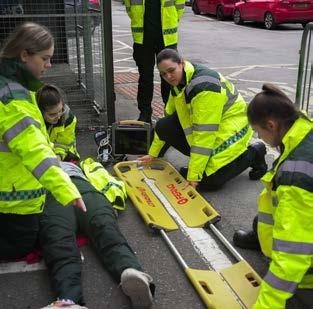



BNU is proud to train the nurses; operating department practitioners; midwives, paramedics, social workers and police officers of the future, many of whom choose to stay on and work in the local area after graduation. All BNU’s graduates make a difference in the real world through their significant contribution to sectors and industries including design; music and film; sport; business and law; and aviation.
The University provides a high-quality learning experience for all its students, and the league table successes the University has achieved in 2022-23 are outlined in the Strategic Report section. The University retained BNU its top 10 position for teaching quality among nonspecialist providers in the Sunday Times Good University Guide 2024 which is testament to its continuing progress, symbolising its proud history of offering employment focused and skills-based learning.
Applying knowledge in authentic workrelated scenarios is a hallmark of every course at BNU. From day one, the University encourages its students to focus on their future careers and to take advantage of the many opportunities to bolster their job prospects while they study. In partnership with the Students' Union, the University does everything it can to ensure its students are well prepared to stand out in the highly competitive employment market when they graduate. It is why BNU graduates go on to be successful in their chosen careers, and the University takes great pride in all that they achieve.
As a proud placement-focused provider in various courses, BNU’s students benefit from the many partnerships the University has grown in its recent history, but it also supports them to secure their placement hours through other innovative routes. One example is BNU’s sports therapy students who give up their weekends to volunteer at the London Marathon, local triathlons and half marathons along with Buckinghamshire’s biggest charity bike ride, Tour De Vale. The students supported the competitors who were fundraising for the Motor Neurone Disease Association and Wheel Power,
the national charity for wheelchair sport which provides opportunities for disabled people to play sport and lead healthy active lives. Other charities which have benefited from students’ support include Macmillan, Chiltern Samaritans, Cancer Research UK and the Chiltern Multiple Sclerosis Centre.
The University is also proud that its library offers optimum use of technologies in book and e-book acquisition and in BNU’s self-issue machines which use RFID technology for efficient book circulation. It is just one way in which BNU strives to provide its staff and students with access to learning resources and services in the most efficient way.
The University’s award-winning cost of living package exceeded £2m in this financial year and incorporated financial support schemes, subsidised accommodation, and the Universityfunded Big Deal initiative run by the Students’ Union saving participating students up to £200 per month on such things as free societies and meals. This approach epitomises BNU’s simple but compelling ethos – do the right thing by its students and put them first – in helping the University to respond quickly to emerging challenges for the benefit of its student body, of which most are mature learners, and first in family to enter higher education; 40% live in areas of high deprivation; 37% live in areas with low participation to university; and crucially, one-in-five come from local areas so are an integral part of the community the University serves.
In 2022-23, BNU shared £855187.98, between 1,963 students who were in need through several of its bursaries, which did not need to be repaid.
35% of the young people BNU worked with during the year would be firstgeneration university students; one in three (33%) were members of the BAME community; 27% of students received free school meals and 21% formally identified as having a disability . More than half (51%) students lived in areas with low participation to university (POLAR4 Q1 and Q2) and 32% lived in high deprivation areas. In addition, BNU welcomed students from the Probation Service, Young Carers, GRT communities, 54 children from service families and 49 care-experienced students. Almost a quarter (23%) of students received free school meals.
In 2022-23, BNU shared £855187.98, between 1,963 students who were in need through several of its bursaries, which did not need to be repaid.
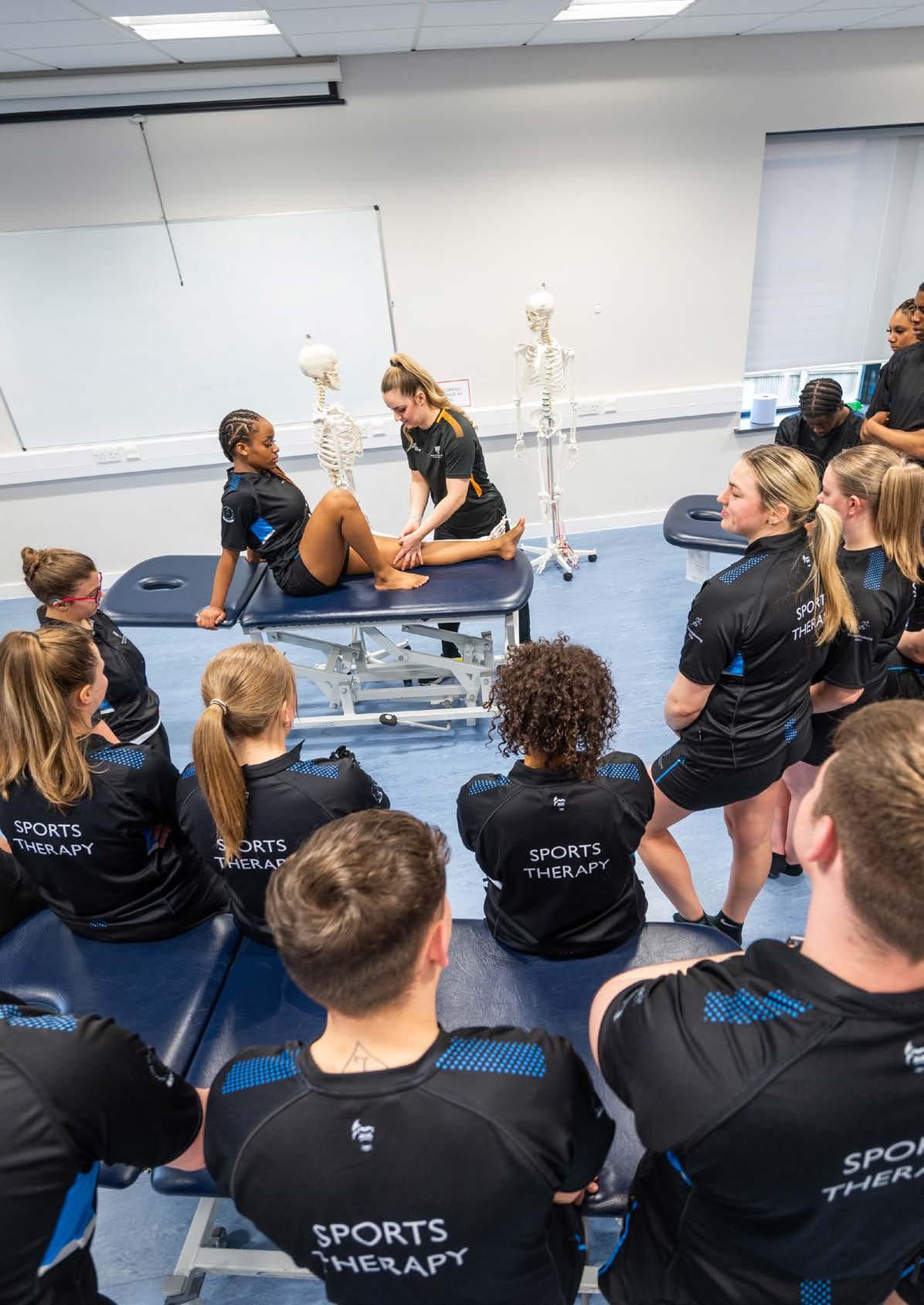
BNU takes its sustainability responsibilities seriously and is committed to achieving a sustainable future. The University’s approach to sustainability goes beyond the traditional focus on environmental sustainability: it aspires to improve environmental, social, and economic sustainability both across the University, and the wider community.
BNU recently published its first-ever Sustainability Strategy. The strategy emphasises the need for the University to take a holistic approach to its social, environmental, and economic impacts. BNU’s efforts will focus on improving the learning and working experience for its students, staff, and partners. It is important to the University that it not only reduces its carbon emissions, but makes its buildings and campuses wonderful places to live, work and study.
BNU will strive to become a sustainability leader in the following fields:
• Greening urban sites
• Civic Engagement
• Decarbonisation of properties and supply chains
• EDI, Health and Well-being
To do this the University will:
Continually improve the sustainability of our sites
Enable, empower and support the BNU community to tackle their sustainability impacts
Provide the education, advancement dissemination and application of sustainable development
Maximise the impact of BNU's environmental sustainability activities at local, regional, national and international levels through collaboration, partnership and communications
Become a leader across the HE sectors in terms of environmental sustainability
Inspiring the next generation, by leading by example, remains the University’s greatest opportunity to drive progress. BNU has set itself a series of systematic and thoughtful goals and targets covering a range of social, economic and environmental sustainability matters. BNU’s direct social and environmental impacts are only a small part of its total impacts. In recognition of this, BNU is working with its partners and communities to promote social value, environmental good practices and progress against the UN Sustainable Development Goals.
It is increasingly clear just how important it is for all BNU staff and students to be familiar with the principles of sustainable development. The University has the opportunity to help give its staff and students the tools to make the world a better place, and the confidence to know that together the BNU community can achieve great things. To do this, BNU discusses its sustainability principles and plans with all new staff as part of its induction process and invites colleagues to help it improve.
The University also holds frequent student engagement sessions throughout the year and the includes students on its Sustainability Committee.
Energy and carbon reduction projects for 2022-2023 included:
• Insulated 1,300m2 of roofs to improve student and staff comfort, reduce energy use and save 36 tonnes of CO2 per year
• Replaced 213 leaky single-glazed windows with modern double-glazing to improve comfort, reduce noise, save energy and reduce emissions by about 50 tonnes of CO2 per year
• Carried out decarbonisation audits of all its buildings, the findings will be published in its upcoming Decarbonisation Plan
• Changed how BNU procures energy to cut its Scope 2 emissions to zero as of April 2023, an annual saving of c.1,300 tonnes of CO2
• Commissioned the replacement of almost 3,000 light fittings with high-efficiency LED lights across its High Wycombe campus to take place during 2023-2024
• Improving its electrical infrastructure to enable it to move to low-carbon heating systems
• During the last year, BNU has cut its CO2 emissions by more than 350 tonnes, a reduction of 14%
BNU is proud to be one of the founding members of the Nature Positive Universities Pledge. Since joining the scheme, BNU has carried out two biodiversity improvement projects and has plans to increase biodiversity and wellbeing further in the coming years.
In recognition of the importance of green space and biodiversity, the University recently completed a new garden on its High Wycombe to provide staff, students, and local residents with a place to reflect and enjoy nature. The garden includes hundreds of new plants from approximately 30 different native species and new bird and bat boxes.
BNU engaged a social enterprise to build an acoustic screen and bench which helped to shield the garden
from road noise and make the space more private and pleasant. In line with its Sustainability Strategy, the bench was made from reclaimed wood from the roof of an old primary school and furniture making offcuts, both of which would otherwise have been used as firewood.
The University’s Nature Positive plans also include the continued improvement of its wildflower meadow and the introduction of more pockets of biodiversity.
BNU’s procurement and sustainability teams are developing a sustainable procurement strategy through which we will ensure that its entire supply chain shares our values. Wherever possible, BNU will procure goods and services from social enterprises. Its teams have successfully trialled sustainable procurement practices in its recent lighting, indoor planting and catering tenders.
It is important that the University’s partners share its values and motivations. Over time, BNU aspires to only work with organisations who share its motivations and values. The University is working with an employeeowned, B-Corp certified architectural practice to develop its long-term green estate plans. These projects will help the University improve biodiversity, and student and staff wellbeing across its High Wycombe campus by providing nature-focused spaces for staff and students to relax and socialise outdoors. BNU is proud to be working with a certified B-Corp that shares its attitudes to sustainability and the public good. A B-Corp is independently certified as a business that meets a high standard of social and environmental performance, transparency and accountability.

The New Usage scheme, which re-uses and recycles items left by students in halls of residence at the end of the year, continues to thrive thanks to the hard work of the Students’ Union. The scheme was awarded a ‘Highly Commended’ in the 2022 Green Gowns Award.
• The solar panels fitted across three of its buildings continue to generate free clean energy. Last year, panels generated almost 150,000 kWh of energy, enough to power 44 households and save 25 tonnes of CO2 each year
• The University’s Estates and Facilities teams have been using electric vehicles for some years now, and BNU will continue to support the use of electric vehicles by its staff and is exploring opportunities to reduce its transport emissions
• BNU’s new catering offering focuses on integrating social value and environmental sustainability while providing the highest quality of food at an accessible price
• The University has continued to develop its decarbonisation plans and prioritise the reduction of energy demand through making improvements to insulation. By improving the insulation of its buildings, BNU can improve employee comfort and reduce its carbon footprint
• BNU has increased the level of planting across its High Wycombe campus, prioritising the use of plants that attract bees and butterflies, and those that stimulate the senses
• The University has worked with Buckinghamshire Council to adopt, restore and replant a parklet; this parklet was installed at its Brook Street residences to provide additional green space and seating

• Relaunched the University’s Sustainability Committee which includes staff and students from across the University
BNU manages and disposes of its waste responsibly.
• Recycling facilities are available for paper, card, plastics, metal, electrical equipment, batteries and mattresses
• BNU has developed new and stretching targets for waste management. Its efforts will focus on the reduction of waste and increasing recycling
• BNU is working on food recycling at its campuses and halls of residence, and coffee cup recycling for its cafés. The discount for using reusable cups has been reinstated and BNU is working to reduce the use of nonrecyclable materials
• The University’s catering offering is shifting to the use of recyclable or compostable food and beverage containers as standard
• Wherever possible, BNU procures used furniture that is in good condition to prevent good quality materials from going to landfill
• The University works in partnership with a local charity wood merchant to recycle products as outdoor furniture across its estate
• Waste that cannot be recycled is sent to a waste-to-energy plant where possible, and to landfill only as a last resort

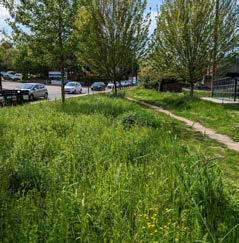
As part of the University’s commitment to the United Nations Sustainable Development Goals (SDGs) Accord, BNU has continued to progress its work in several goals across its campus areas, particularly No poverty (SDG1), Zero hunger (SDG2) and Good health and well-being (SDG3).
During half-term in October 2022, the University collaborated with local foodbank One Can Trust, the Clare Foundation, Buckinghamshire Council’s Helping Hand programme, the Wycombe Swan and Students’ Union to host free hot meals and crafts activities, to support 37 families of 128 guests facing poverty. The feedback was positive with one parent expressing it was the first proper meal they had eaten in three days, while another was grateful to be included as they no longer received pupil premium payments and had recently come into hardship with the cost of living rising. During half-term in February 2023, BNU supported the One Can Trust again with a donation and volunteer support for the delivery of more than 400 meals to vulnerable families with one parent saying: “It’s hard to make ends meet, having these meals has made sure everyone is full and not hungry.”
After a successful Give to Refresh initiative in 2020 before the pandemic, which saw BNU staff and students join forces with the national Beauty Banks charity to help local people living in hygiene poverty by donating more than 1,000 items to 890 local families. In 2022-23, BNU has reignited this as part of the University’s response to the costof-living crisis with donations to be split between the Chiltern Toy Bank and a local foodbank.
The University’s volunteering policy gives all staff two days’ paid leave each year to support charities of their choice. Charities which continue to benefit from this initiative include Hounds for Heroes, One Can Trust, Blood Bikes, and local hospices. The Students' Union also promotes volunteering to students and a total of 16,058 volunteering hours were logged in 2022-23. Ellie Lee won Volunteer of the Year at this year’s Union Awards after packing monthly Monday meals, performing at care homes with Musical Theatre Society and packing over 100 wellbeing boxes to support the Union’s Winter Feel Good week. BNU is proud of all that its University community does to make a difference in its local communities.
In October 2022, the University’s Institute for Health and Social Care facilitated a community engagement event which saw more than 200 visitors at the University’s Aylesbury Campus. In a partnership with Buckinghamshire Council and local community groups, the event was the first of its kind, aiming to engage ethnic minority communities in the local area. The event provided an opportunity for attendees to share their lived experience and discuss the challenges they may have faced in accessing health information and services on topics such as prostate care, menopause, diabetes, heart conditions, mental health and general wellbeing.
In June, the University was delighted to welcome His Majesty’s Lord Lieutenant of Buckinghamshire to cut the ribbon and open the doors to the Buckinghamshire Community Wellbeing Hub at its Aylesbury Campus. The Hub forms an important part of the University’s contribution to a nationwide commitment to integrated care systems, the Government strategy to bring together placed-based partner organisations to support the health and wellbeing of local citizens and has been
created in partnership between the University and Buckinghamshire Health and Social Care Academy.
Hosted by the School of Art, Design and Performance, the BNU Graduate Design Show once again publicly showcased the very best student work from fifteen art and design disciplines, including examples of fashion design, photography, interior special design and creative advertising.
BNU marked Black History Month to celebrate the history of Black people and the immense contribution they and other ethnic minority groups make to the University and society. Throughout October 2022, staff and students held and attended a series of events held by the renamed Race Equality Network for staff that recognised the positive contributions and achievements of ethnic minority communities. The Network is responsible for raising awareness and promoting opportunities to achieve greater race equality at BNU.
BNU continues to make great strides in addressing racial inequalities and creating an inclusive culture and environment where individuals can thrive, irrespective of their race or ethnicity. After pledging its commitment to the principles of the Advance Higher Education Race Equality Charter (REC) in 2020 by improving the representation, progression and success of staff and students from different ethnic backgrounds within higher education. In November 2023, BNU aims to submit its application for Race Equality Charter status which encapsulates the University’s important role in addressing racial inequalities in its local communities.
To support the University on this mission, BNU has partnered with local African and Caribbean heritage charity St Vincent and the 2nd Generation, based in High Wycombe, to improve the lives of ethnic minority communities. The collaboration aims to facilitate and enhance social and cultural
exchanges; drive research to improve the experiences of African Caribbean communities in Buckinghamshire; and provide local and international skills development. Both organisations will support each other in improving race equality in Buckinghamshire and beyond. In the first two events held together, the University marked Windrush 75 with daytime workshops for local school children and an evening celebration for the Windrush Generation and local stakeholders.
In December 2022, BNU and Wycombe Wanderers Football Club reignited their long-standing alliance with a new threeyear partnership that offers students wide-ranging educational benefits and will strengthen collaboration on civic engagement initiatives in the local community. By becoming the Official Higher Education Partner of the football club, BNU’s students benefit from exclusive opportunities to undertake work placements with the club. A recent research project undertaken by the University for the club and community’s benefit was into the representation of women spectators at Adams Park on matchdays. Launched on International Women’s Day in 2022, the project sought to determine motivating factors for women fans’ attendance and non-attendance at WWFC fixtures and to help strengthen the sense of equality and inclusion felt by its women spectators. The findings will be shared with the club in Autumn 2023.
BNU is proud to host the National Disability Arts Collection and Archive (NDACA), the first physical location of its kind dedicated to Britain’s disability arts movement which features more than 3,500 pieces of artwork. The University’s commitment to NDACA is a symbol of its overall commitment to supporting achievement among disabled people.
Buckinghamshire New University is the principal funding partner of Bucks Students' Union, an independent educational charity with a mission to make life better for students at BNU. The University invests in the Students’ Union because it believes it is important to support their work, not only in supporting and developing BNU’s students, but in building links between their members and the local community; charity fundraising; volunteering; citizenship and endeavours to promote fair trade, sustainability, social inclusion and environmental and ecological good practice.
In 2022-23, BNU Students' Union received a funding grant of £1.6m from the University. This enables the Students’ Union’s to curate its unique Big Deal initiative on behalf of the University so that all students, irrespective of their income, can access recreation, sports and skills development opportunities for free. The University is proud to help remove any financial barriers to its students participating fully in all aspects of university life at BNU.
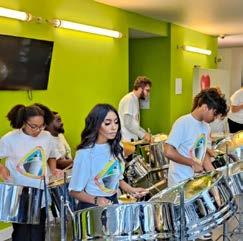
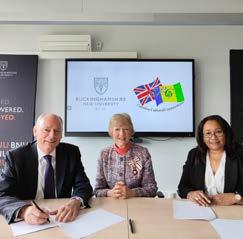
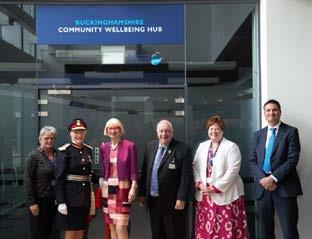

BNU is proud of everyone in its diverse and inclusive University community and works tirelessly to break down barriers to ensure that everyone can benefit from the transformative education it provides. Some 37% of its students come from postcodes with lower participation rates in higher education, and 40% of students are from the most deprived areas.
In order to fulfil its Access and Participation Plan objectives, the University embeds widening participation (WP) activities to address risks to equality of opportunity. In 2022-23, BNU continued its work with local schools and colleges as part of this commitment and was delighted that almost 4,200 school pupils engaged across 260 BNU events.
35% of the young people BNU worked with during the year would be firstgeneration university students; one in three (33%) were members of the BAME community; 27% of students received free school meals and 21% formally identified as having a disability. More than half (51%) students lived in areas with low participation to university (POLAR4 Q1 and Q2) and 32% lived in high deprivation areas. In addition, BNU welcomed students from the Probation Service, Young Carers, GRT communities, 54 children from service families and 49 care-experienced students. Almost a quarter (23%) of students received free school meals.
With the impact of the COVID-19 pandemic waning, BNU was able to increase its support to students from year groups 6 to 13, delivering more than 1,800 hours of engaging in-person and blended activities throughout the year, including campus-based tours and workshops; course tasters; virtual CV and UCAS support; mock interviews and portfolio reviews. The team also provided parental support and teacher CPD sessions.
The University’s Futures Days campus visits are aimed at Year 9/10 students, offering a first-hand experience of university life to encourage them to consider higher education, irrespective
of their background. In 2022-23, BNU held 22 Futures Days which were offered to all local schools which meet its WP criteria. Feedback showed these days helped changed the mindset of many students who are now considering university having previously thought this was not a viable option. For older age groups, BNU supports both their move into further education and their application to higher education. BNU offers special on campus taster days collaborating with course academics. The University actively seeks to recruit Student Ambassadors who attended its target WP schools to provide relatable role models to the school pupils with whom it works.
BNU is committed to playing its part to respond to the increasing emphasis by government and schools on the importance of careers advice and attainment raising. The University is committed to a meaningful local offer to support young people and has forged progression partnerships with several local colleges. This includes formalising the existing recruitment and WP activity plus additional support.
BNU has taken forward the lessons of the COVID-19 pandemic and strengthened its new programmes such as the eight-week Fashion Futures initiative where academics in the University’s Fashion course team provided subject-specific widening participation support and BNU continues to grow its Saturday Arts Club.
Of the 30 young people who participated in 2022-23, half (15) of the participants had either special educational needs or were neurodivergent. Based on the areas the
participants lived in, five (17%) were from the lowest quintiles for the Index or Multiple Deprivation; 13 (43%) from Education, Skills and Training Deprivation’ and 11 (37%) from Income Deprivation Affecting Children Index. BNU has also welcomed the care experienced and young carers on to the programme.
BNU is a partner in Study Higher, part of the National Collaborative Outreach Programme, which targets students from areas where progression to higher education is low. BNU takes part in joint ventures with its partners – Oxford Brookes University and the Universities of Reading and Oxford. Events include mentoring, wellbeing, residentials and revision and study skills.
The team is working on the First Generation Fund project which seeks to support first in generation students into university and whilst they are studying. A proposal has been put forward for a series of activities, mentoring and support with AUTC and BCG and has been enthusiastically received by the colleges. The University is currently firming up the details and envisage this project will begin in September 23.
Other projects add to BNU's civic engagement with the local community, including trustee work with Cressex School, celebrating Black History Month with inspiring Black professionals from BNU and school pupils, the Spark2life summer school and welcoming its local primary school onto campus. BNU is proud to work with these most-in-need communities as it embodies what it stands for – providing opportunities for all irrespective of background or circumstance.

BNU’s Thrive 28 strategy builds on Impact 2022, delivering the University’s mission of transforming lives through inspiring, employment and profession-focused education, and enabling people positively to impact society and their future. The Thrive 28 strategy affirms the long-term strategic vision for BNU to become a University that is highly connected, permeable, student- and customer-focused, business-oriented, strategically aligned, impactful and aligned to strategic partners.
The University will develop its position as an innovative, teaching-oriented University, delivering sector-leading and life-changing educational and employment outcomes, and deliver research and innovation that impacts and enhances lives and society and underpins its educational offer. BNU will be an outwardly focused institution, entrepreneurial in spirit, meeting its ethical and social responsibilities, expanding its reach through working together with learners, employers, the public, and strategic partners. The University will reach out to all its communities, cementing its position as Buckinghamshire’s University, and building on its civic engagement within the county, London and the South-East and further afield.
To support the University’s strategic intent to expand the healthcare offer, BNU secured funds from the OfS (2021-2022) which has enabled the refurbishment of the third floor at its Aylesbury campus. This development will enable the University to establish a Centre of Excellence in Digital Healthcare. The three key themes that underpin the University’s digital healthcare strategy are:
1. Enhancement of existing curricula by incorporating digital technologies and establish live ‘digital health’ projects into existing modules;
2. Developing new postgraduate specialist courses designed to mobilise and upskill the existing workforce and create new pathways or optional modules within its undergraduate and postgraduate courses e.g., BSc Data Science with Health Informatics. BNU will also develop micro credential courses, supported by lifelong learning, along with apprenticeships and Higher Technical Qualifications (HTQs); and
3. Engaging with local businesses to fund and support research initiatives in digital health, focusing on areas where of expertise in the University such as dementia care.
The University’s new state-of-the-art teaching facilities for healthcare courses include an immersive virtual reality room. The audio-visual capabilities enable different immersive environments to be generated, for example public spaces, acute hospital wards, operating theatres and community home settings. The functionality also allows for interactive screen engagement with patient scenarios and data. This exciting teaching and learning innovation not only brings efficiency in space usage but will also enable increased external engagement, particularly with the local Buckinghamshire Healthcare NHS Trust and Buckinghamshire Council. For example, students linking into digitally enabled live case conferences, co-delivery of staff training and the hosting of community health and wellbeing events.
Funding secured from NHSE England (formally Health Education England South East) has also enabled the creation of the Buckinghamshire Community Wellbeing Hub at its Aylesbury campus. The University’s Institute for Health and Social Care (IHSC) worked in partnership with the Buckinghamshire Health and Social Care Academy (BHSCA), to launch the Hub in June 2023. The Community Wellbeing Hub objectives are to:
1. Create a physical space for health and social care professionals, charities and voluntary organisations to collaborate and co-locate services to improve the health and wellbeing of citizens;
2. Support student wellbeing and mental health through the Hub, complementing the University’s award-winning student support services; and
3. Provide opportunities for learners to develop skills and gain work experience, including volunteering, placements, job shadowing, and training.
The University’s continued engagement with the Buckinghamshire Local Enterprise Partnership (BLEP) reflects its commitment to help drive the skills agenda for the county and meet the needs of the local employers and the region. The University also works closely with the unitary Buckinghamshire Council to support them in progressing many of their ambitions.
BNU plays its part in responding to the needs of the Skills for Jobs white paper in partnership with local FE colleges, Buckinghamshire’s UTC, and secondary schools. BNU is also proud to belong to the Arc Universities Group of nine universities that is driving forwards the research and education needs of the South of England.
BNU provides incubation spaces at its High Wycombe and Aylesbury campuses, enabling entrepreneurs and business start-ups to work flexibly and at low cost.
External engagement is deeply reflected in the activities of the senior team as they lead the delivery of Thrive 2028 and its commitment to strengthen engagement with key strategic partners.
The University is a member of GuildHE, one of two officially recognised representative bodies for higher education which enable the voices of universities to be heard, the other being Universities UK, of which the University is also an active member, through the contributions of the Vice-Chancellor, Professor Nick Braisby. The University is also a member of the All Party Parliamentary Universities Group.
The Vice-Chancellor has a number of external roles which help ensure the University’s voice influences national and regional policy. During 2022-23, Professor Braisby remained a member of the joint UUK and GuildHE Climate Action Group and continued his role as a member of the Executive Board of GuildHE, on which he fulfils the role of Board EDI Champion. He also continued to serve as a member of UUK’s Audit and Risk, and Resources Committees.
Within the region, the Vice-Chancellor joins other senior leaders of higher education institutions as a member of the West London HEI Vice-Chancellor’s group, a group aimed at ensuring higher education plays a significant role in the economic regeneration of West London, a region badly hit by the COVID-19 pandemic and ongoing cost of living crisis. He also serves as a member of the Governing Board of the Oxford to Cambridge Arc Universities Group.
Within the county, the Vice-Chancellor became a member of Buckinghamshire Council’s Opportunity Bucks Board in 2022, joined the Council’s Growth Board, and chairs the Council’s Skills Strategy Board. He continues his engagement with Buckinghamshire Culture as a member of its Board of Trustees and is also a member of Buckinghamshire Council’s Strategic Partners Board.
The University’s Vice-Chancellor is also a member of the Learning Analytics and Innovation Board sponsored by Civitas Learning Inc. and is a member of the Board of Trustees for the University College of Estate Management.
Pro Vice-Chancellor, Professor Paul Morgan is a member of the Buckinghamshire Health and Social Care Academy (Volunteer Faculty) that coordinates student volunteering opportunities and led to the establishment of the Community Wellbeing Hub in 2023. Professor Morgan continues to work
closely with sports networks across Buckinghamshire including LEAP (Active Health Partnership) and the National Performance Centre for Swimming, a partnership between Wycombe Swimming, BNU, and Swim England.
Ellie Smith, University Secretary and Clerk to Council is a member of Higher Education Strategic Planners Association and has an active involvement in AdvanceHE’s Effective Governance initiatives.
The University’s Commercial and Business Development Director, Ian Harper, has been a member of Buckinghamshire College Group’s governing body since 2014, maintaining strong working relationships between the two institutions such that our offers are complementary and that college students have a seamless progression route to their local university if they choose to progress to higher education.
The Director of the Institute for Health and Social Care, Professor Karen Buckwell-Nutt is a governing board member of Aylesbury UTC and is CoChair of North-West London Health and Social Care Academy; Vice-Chair of London Higher Education; Co-Chair of Regional FE/HE Health and Social Care Working Group, and Co-Chair of Pan London Education Alliance.
Within the county of Buckinghamshire, Karen is an active board member for Buckinghamshire Health and Social Care Academy and sits on the Project Board for Buckinghamshire Community Wellbeing Hub.
Dr Paul Maloret, Head of School for Nursing & Midwifery is a Board Member for Positive Choices, the largest annual UK conference for people with learning disabilities which provides seminars and presentations on the latest research and best practice to more than 600 preregistration nursing students.
The Head of School for Art, Design and Performance, Professor Sri-Kartini Leet is an Advisory Board member of Young Creative Bucks Cultural Education Partnership, as well as a representative member of the Board of Trustees for Buckinghamshire Culture. Professor Leet is both the EDI and Institutional Lead for the Council for Higher Education in Art & Design’ and a Member of Fashion Academics Creating Equality which seeks to seeks to embed culture and diverse perspectives into the curriculum.
Dr Russel Stone, Head of the School of Creative and Digital Industries is a committee member of the Royal Television Society Technology which organises and runs a programme of lectures, workshops, masterclasses, and awards throughout the year. Russell is also a member of the West London FE/ HE working group on creative and cultural skills to develop a collaborative, sub-regional approach to skills interventions relating to creative and cultural industries.
Lisa Wyld, Head of Missenden Abbey International Hotel and Hospitality School is a Member of the Executive Committee for the Council for Hospitality Management Education (CHME) and co-founder of Hospitality and Universities United. Lisa is also an ambassador for the Springboard Charity which helps disadvantaged and unemployed people of all ages and backgrounds gain the skills, knowledge and experience needed to flourish in a lifelong career within hospitality, leisure and tourism.
Rachael Cornwall, Director of HR is an AdvanceHE Race Equality Panellist; member of the Universities HR South East region HR Directors group; and a Chartered Institute of Personnel and Development Enterprise Adviser.
BNU’s Director of Strategic Planning & Change, Matt HielyRayner co-chairs the Higher Education Institutional Research network.
The University has very strong links with NHS Trusts and social care providers in the region. Its expansion of the health and social care programmes it offers, and the establishment of the Institute for Health and Social Care (IHSC), exemplifies how BNU is helping to shape and support the regional health and social care agenda by playing its part in addressing the health needs of the county, and the UK more widely. A number of courses have been co-designed and co-developed to respond to workforce needs including
• MSc Diagnostic Radiotherapy -pre-registration
• PGDip Approved Mental Health Professional (AMHP)
• BSc (Hons) Occupational Therapy (UCAS and Apprenticeship)
The strategic partnering and leadership shown by the University has helped to establish the Buckinghamshire Health and Social Care Academy, which is proving to be a key link into the newly established BOB (Buckinghamshire, Oxfordshire and Berkshire West) Integrated Care Board (ICB). ICBs are statutory organisations responsible for bringing the NHS
together with local authorities to: further the integration of health and care; improve the health of local populations; transform the quality of care provided; and ensure they are sustainable within allocated funding.
Meetings have already been held between BNU and leaders on the ICB to explore opportunities and requirements to address the requirements in the NHS Long Term Plan, which was published July 2023.
As part of the government’s health and social care reforms, regional ICSs have been created, each having an ICB, to: further the integration of health and care; improve the health of local populations; transform the quality of care provided; and ensure they are sustainable within allocated funding.
The North-West London Health Academy, of which the University is a member of, is co-chaired by the Director of Institute for Health and Social Care, and has now broadened its remit to include social care which links to the North-West London Integrated Care System (ICS).
In addition to the ICB engagement, BNU is continuing to work with FE colleges and healthcare service providers to co-create and deliver relevant work-based training programmes and meet the health needs of the region, demonstrating the University’s commitment to being an anchor institution within its county and the towns in which its campuses are based.
In 2021, BNU joined a small number of UK universities in achieving Talented Athlete Scholarship Scheme (TASS) Dual Career Accreditation in recognition of the support BNU provides to help talented athletes to reach their potential in education alongside achieving success in their sport. As a university TASS delivery site, BNU supports 28 talented athletes in its local community across a diverse range of sports from judo to snowboarding. BNU currently supports aspiring GB rowers at the Leander Club in Henley and more recently it supported a new GB Rowing initiative in Windsor. The University is proud to work with its Students' Union, Swim England, and Wycombe District Swimming Club, as a national performance centre for swimming to promote dual career development for athletes. The University is also accredited by TASS and the Football Association to lead on the roll out of the new Women’s Professional Game Academy programme (linked with Reading Women’s FC) to deliver sports therapy, psychology, nutrition and personal development to support players’ academic and sporting aspirations.
BNU’s 14 student-athletes continue to thrive and benefit from an extensive programme of support including sports therapy and strength and conditioning. In 2023, a student paramedic won gold for BNU at the BUCs snowboarding championship. One talented Fine Art student-athlete secured gold at the South of England Indoor Athletic Championships early in 2023. A recent graduate, still supported at BNU through TASS, was selected for team GB at the IBSA World Games in goal ball. Furthermore, one of the University’s postgraduate student athletes represented Team GB in Georgia as part the national sabre team. Finally, the University is delighted to launch its
university basketball programme in partnership with the Students’ Union and Reading Rockets, student athletes will have the opportunity to combine their studies with playing opportunities at the national division 3 level.
BNU is amongst 140 employers nationwide to receive the prestigious ‘Defence Employer Recognition Scheme Gold Award’ from the Ministry of Defence. The award celebrates the University’s outstanding support for those who serve, veterans and their families and is recognised as the ‘highest badge of honour’. The University’s focus is to develop career-ready graduates and support military students with programmes led by employed veterans and reservists. BNU is a committed supporter of military and veteran employability, and of the families of service personnel who are often subject to job and school disruption due to postings around the UK and abroad.
BNU has a significant number of former service personnel in full time employment, teaching on various courses and partnership activities, and is proactive in its engagement with students to develop links with, and understanding of, military opportunities. The University employs serving military personnel as associate lecturers and within affiliate parties such as Oxford University Air Squadron and Oxford University Officer Training Corps, both of which recruit from BNU’s student body.
In its Access and Participation Plan submitted to the OfS, the University emphasises a commitment to supporting service families through events for children/students from military backgrounds. External engagement includes membership of the Buckinghamshire Armed Forces Covenant Civilian and Military Partnership Board. BNU also works with the British Legion, RAFA, NHS and various charities including Hounds for Heroes.
BNU is involved with several collaborative projects to improve outcomes for military experienced
children with its Study Higher partners, including Oxford Brookes University and the Universities of Oxford and Reading, along with six further education colleges. The University is also working collaboratively in a governmentfunded outreach project working with universities, schools and colleges in Oxfordshire, Swindon, Buckinghamshire and Berkshire.
Furthermore, the University supports FutureFocus with a series of university campus visits and some webinars for students from Armed Forces families. To date, BNU has taken students on fully funded visits to The Royal Agricultural University, University of Oxford, and the University of Reading. On these trips, students have had the opportunity to experience university life, receive information about alternate pathways into higher education, and talk with student ambassadors who have similar backgrounds.
BNU also offers dedicated programmes for military personnel such as the highly successful BA (Hons) Organisational Capability Development and BSc (Hons) Strength and Conditioning Armed Forces. Both programmes are designed to be cost viable opportunities for military personnel to gain education and career enhancement.


During 2022-23, the University was subject to the ongoing conditions of OfS registration, and also adheres to the Committee of University Chairs (CUC) Higher Education Code of Governance. As such the governing body must ensure institutional financial health including adopting effective systems of control and risk management which promote value for money, meet mandatory audit requirements, and produce accurate and quality assured institutional data.
In order to ensure that the strategy and its key performance indicators can be achieved, the University’s Council also identifies and closely monitors business risks. Members of BNU’s executive team provide regular briefings to the Audit Committee and to the University’s Council, allowing Governors to monitor the assessment, mitigation and responses to these risks.
For the duration of 2022-23 the prevailing process of risk management, which had received substantial assurance from risk auditors in 2017-18, was adhered to. Reviews of risk policy and risk management processes were completed during the year, resulting in some important changes to means by which risks are escalated from the local level to the strategic level. Following a workshop with members Council and external auditors, the University’s risk appetite is now being expressed against each item in the strategic risk register.
Further details on the University’s risk management procedures and policies are set out in the statement of corporate governance.
Strategic risks are listed below and each can be classified in one or more of the four key risk themes the University has identified: financial sustainability; compliance; reputation; and organisational effectiveness.
Failure to ensure the safety and security of staff and students
Failure to control costs, grow income and invest in the future
Failure to comply with sector and statutory regulations
Failure to deliver value for money, high quality services and facilities
Failure to deliver student success outcomes, including retention and completion targets
Failure to manage the quality and the scale of partnership activity
Failure to recruit to student number targets
Failure to grow research and enterprise activity
Failure to offer academic programmes that deliver key graduate attributes, employment skills and experience opportunities
Failure to deliver fit-for-purpose digital systems and technology
Failure to deliver human resources strategy
Failure to meet academic standards

The following statement is provided to enable readers of the financial statements of Buckinghamshire New University to gain a better understanding of the governance and legal structure of the University and covers the period 1 August 2022 to 31 July 2023.
Buckinghamshire New University is an independent corporation, established as a Higher Education Corporation under the provisions of the Education Reform Act 1988 and the Further and Higher Education Act 1992. It is an exempt charity as defined under the Charities Act 2011.
The University is regulated by the Office for Students (OfS) which was established 1 April 2018 and is the principal regulator for English higher education institutions that are exempt charities. Previously it was regulated by the Higher Education Funding Council for England (HEFCE). During 2022-23, the University’s Council, as trustee of the University, continued to have due regard to the Charity Commission’s guidance on public benefit and its supplementary guidance on the advancement of education.
The University conducts its business in accordance with the OfS public interest governance principles, the seven principles identified by the Committee on Standards in Public Life (the Nolan Principles) and with the guidance to institutions of higher education provided by the Committee of University Chairs (CUC). The University’s Council is satisfied that it is aligned to the HE Code of Governance published by CUC in December 2014, revised June 2018 and September 2020 and that the University continues to meet the OfS Ongoing Conditions of Registration.
Its objects, powers and framework of governance are set out in the Articles of Government. Amendments to these Articles must be approved by the OfS (formerly by the Privy Council).
The Articles require the University to constitute a University Council and an Academic Board, each with clearly defined functions and responsibilities, to oversee and manage its activities.
These committees are composed of independent and external co-opted members of the University’s Council. The decisions of all these committees are reported formally to the Council. The University’s Council conducts regular effectiveness reviews of itself and its committees. These reviews include an analysis of attendance, work undertaken and the views of members so that changes can be introduced as appropriate during the next cycle.
As Chief Executive, the Vice-Chancellor leads the development of the University strategy, the identification and planning of new developments and the shaping of the University ethos. Members of the University Executive Team (currently the Vice-Chancellor, Deputy Vice-Chancellor, Pro Vice-Chancellor (Education), Chief Finance Officer, Commercial and Business Director and University Secretary and Clerk to the Council) all contribute in various ways to this aspect of the work. However, the ultimate responsibility to the Council rests with the Vice-Chancellor. In accordance with the Articles of Government of the University, the University Secretary and Clerk to the Council has been designated Secretary to the University’s Council and in that capacity provides independent advice on matters of governance to all Council members.
The University’s Council comprises The University’s Council comprises independent and University members appointed under the Instrument and Articles of Government of the University, the majority of whom are non-executive. The roles of Chair and Deputy Chair of the Council are separated from the role of the University's Vice-Chancellor.
The matters specially reserved to the Council for decision are set out in the Articles of the University, by custom and under the Terms and Conditions of funding for higher education institutions with the OfS. The Council identifies that it has primary responsibilities that it reserves to itself for: the ongoing strategic direction of the University; the determination of the educational character and mission of the University; the approval of the annual estimates of income and expenditure; the approval of major developments and; the receipt of regular reports from Executive Officers on the day-to-day operations of its business and its subsidiary companies.
The Council also has responsibility for:
• The effective and efficient use of resources, the solvency of the University and the Corporation and for safeguarding their assets;
• The employment of those designated by the Council as Senior Employees and their appointment, grading, assignment, appraisal, suspension, dismissal and determination of their pay and conditions of service;
• Setting the framework for the employment, including pay and conditions, of all other employees and contractors;
• Corporate policies, regulations and procedures to assure the effective governance of the University and to meet statutory and other legal obligations, including an anti-fraud and anti-corruption policy.
The Council met six times (all meetings bar two were held virtually using MS Teams) during the year and had several Committees reporting to it, including a Resources Committee, a ViceChancellor Remuneration Committee, a Staff Reward Committee, a Governance Committee, a Student Experience Committee and an Audit Committee. All of these Committees are formally constituted with terms of reference and predominantly comprise of independent members of Council, one of whom acts in the role of Committee Chair.
Subject to the overall responsibility of the University’s Council, the Senate has oversight of the academic affairs of the University and draws its membership entirely from the staff and students at the University. It is particularly concerned with issues relating to the teaching and research work of the University. Senate is chaired by the ViceChancellor in his capacity as Head of the Institution.
The Resources Committee recommends to Council the University’s annual revenue and capital budgets, and monitors performance in relation to these approved budgets and key performance indicators. The committee usually meets four times during each academic year.
The Governance Committee considers and is responsible for the effective operation of the University’s Council in accordance with the CUC HE Governance Code of Practice including the nomination, appointment and induction of new members to ensure an appropriate mix of skills and expertise.
The Vice-Chancellor Remuneration Committee reviews the performance of and determines the remuneration of the Vice-Chancellor and is responsible for approving the Staff Note for publication in the annual Financial Statements for publication on the University’s website. The constitution of this Committee does not include the Vice-Chancellor.
The Staff Reward Committee determines the remuneration of the senior employees, excluding the Vice-Chancellor and is responsible for approving the University’s Annual Remuneration Report and Statement.
The Student Experience Committee is responsible for monitoring key performance measures in relation to the student experience including the contribution of the Students’ Union.
The Audit Committee meets quarterly, and independent members may meet privately with the internal and external auditors to discuss audit findings. It considers the detailed internal audit report findings prepared by BNU’s internal audit service; monitors adherence with regulatory requirements; and oversees the institutional risk register, prepared by the University from local risk registers, for presentation and consideration by the Audit Committee. The committee also reviews the annual financial statements and accounting policies; the system and processes for the preparation and submission of statutory returns to the OfS and the Higher Education Statistics Agency (HESA); and the effectiveness of the systems of internal controls. The committee receives and recommends an annual report on risk to the full Council.
The University’s Council acknowledges its responsibility for ensuring that an effective system of internal financial control is maintained and operated by Buckinghamshire New University and the University’s Council confirms it has reviewed the effectiveness of these arrangements.
The system of internal financial control is based on a framework of regular management information, administrative procedures including the segregation of duties and a system of delegation and accountability. The following processes are established to review the adequacy and effectiveness of the University’s system of internal control:
• The University maintains a Councilapproved set of frameworks and policies, including Financial Regulations, which are underpinned by linked policies, such as the Expenses Policy, and procedures in relation to procurement.
• KCG provides internal audit services for the University. KCG provides an annual opinion on the adequately designed and effective arrangements for risk management, control and governance, and for economy, efficiency and effectiveness across the University, in accordance with the CUC Higher Education Audit Committees Code of Practice.
• The Audit Committee receives regular reports from the internal audit service, including its independent opinion on the adequacy and effectiveness of the University’s system of internal control, together with recommendations for improvement.
• Council receives regular reports from the Audit Committee on internal control and the business of the Committee.
• There is a comprehensive budgeting system with an annual and five-year budget which is reviewed and agreed by Council.
• The key elements of the University’s system of internal control, which is designed to support the Council in carrying out its responsibilities, include:
• Clear definitions of the responsibilities of, and the authority delegated to, senior officers of the University
• A comprehensive annual planning process, supplemented by detailed annual income, expenditure, capital and cash flow budgets.
• A regular review of institutional performance and of financial results, involving variance reporting and updates of forecast out-turns.
• Clearly defined and formalised requirements for approval and control of expenditure.
• Procedures for the management of investment and risk.
• A professional internal audit service delivered under terms of reference which reflect guidance issued by CUC, and whose annual programme is approved by the Audit Committee.
The University's Council has established the processes for the identification, evaluation and management of risks that the University faces.
The University’s Council has responsibility for maintaining a sound system of internal control that supports the achievement of policies, aims and objectives, while safeguarding the public and other funds and assets for which it is responsible.
This is in accordance with the responsibilities assigned to the governing body in the Instrument and Articles of Government and the Terms and Conditions of funding for higher education institutions with the OfS.
The system of internal control is designed to manage rather than eliminate the risk of failure to achieve policies, aims and objectives. It can therefore only provide reasonable and not absolute assurance of effectiveness.
The system of internal control is based on an ongoing process designed to identify the principal risks to the achievement of policies, aims and objectives, to evaluate the nature and extent of those risks and to
manage them efficiently, effectively and economically.
More specifically:
• The Audit Committee provides an oversight of risk management.
• Regular meetings between senior managers and service leaders to review progress and issues arising from operational activities, and similar meetings with Heads of School in relation to academic developments.
• Oversight by Resources Committee of matters relating to resource allocation, forward planning, effectiveness and value for money.
• The University’s Council receives periodic reports from the Chair of the Audit Committee concerning internal control and requires regular reports from managers on the steps they are taking to manage risks in their areas of responsibility, including progress reports on key projects.
• A robust risk prioritisation methodology based on risk ranking and cost-benefit analysis has been established and an organisation wide risk register is maintained.
• Clear definitions of the responsibilities of, and the authority delegated to, senior officers of the University.
• Nine internal audits, all of which demonstrated satisfactory assurance with two giving substantial assurance
• External Auditors, in their audit for the year ending 31 July 2023 included consideration of internal control relevant to the preparation of the Financial Statements, the external audit finding no significant deficiencies. The above arrangements all allow the University to be assured that its use of public funding meets all appropriate standards of propriety and regularity.
The University’s Council is responsible for keeping adequate accounting records which disclose, with reasonable accuracy at any time, the financial position of the Group, and for ensuring that the financial statements are prepared in accordance with the Instrument and Articles of Government, the Statement of Recommended Practice: Accounting for Further and Higher Education and FRS102. Within the Terms and Conditions of funding for higher education institutions with the OfS and the University’s Council, through its designated accountable officer, the University is required to prepare financial statements for each financial year which give a true and fair view of the state of affairs of Buckinghamshire New University and Group and of the surplus or deficit and cash flows for that year. The designated accountable officer is the Vice-Chancellor. In preparing these financial statements, the University’s Council is required to:
• Select suitable accounting policies and then apply them consistently.
• Make judgements and estimates that are reasonable and prudent and state whether applicable United Kingdom Accounting Standards have been followed, subject to any material departures disclosed and explained in the financial statements.
• Prepare the financial statements on the going concern basis unless it is inappropriate to presume that the Group will continue in operation.


In the year total income for the Group is reported at £188.8m (2021-22 £169.0m), an increase of 11.7% on last year.

The financial statements presented by the University’s Council comprise the consolidated results of the University and its subsidiary companies (the Group). The Group companies undertake activities which, for legal or commercial reasons, are more appropriately channelled through a limited company. Where possible subsidiary companies pay their taxable profits to the University under the Gift Aid scheme.
The results for the group for the year ended 31 July 2023 are summarised below:
Results for the 2022-23 financial year are a consolidated group surplus of £8.9m (2021-22 £7.6m), exceeding the budget submitted to the Office for Students (OfS). In the year total income for the Group is reported at £188.8m (2021-22 £169.0m), an increase of 11.7% on last year. Total income from full time Home and EU students was £144.5m (2021-22 £132.5m), an increase of 9.1% on last year. The University benefited from increased year on year grant funding income of £9.4m - an increase of £2.7m on last year - strong apprenticeship income, and the increase in the Bank of England base rate - interest income for the year was £1.7m (2021-22 £0.06m). Figure 1 shows a breakdown of the Group’s income by category, 88% of income comes from tuition fees with the remaining 12% coming from a variety of smaller sources. The University also received £1.0m as a result of a revenue share agreement in relation to the sale of the former Chalfont campus in 2011.
Total expenditure for the Group is £180.8m (2021-22 £161.5m), an increase of 12.0% on last year. The most significant change from last year is shown in note 7 - academic related expenditure of £138.8m (2021-22 £119.2m) an increase of 16.4%. Pay costs increased by £3.1m compared to last year, primarily a result of the UCEA-agreed minimum salary uplifts of 3% in August 2022 (with an uplift of up to 9% for those on the lowest points of the pay spine) and the interim pay award from February 2023 of the greater of £1,000 or 2%, being part of the 2023-24 pay award being brought forward. LGPS employer contributions also increased from 17.3% to 18.4% from April 2023, although payments to make up the deficit in the Scheme ceased at the same time. Inflationary pressures impacted all areas of expenditure and the University increased its spend on cost of living support for students.
Total expenditure on staff costs of £43.9m (2021-22 £40.8m) now represents 23.3% of total income (excluding restructuring costs), a slight decrease from last year’s figure of 24.1%. Average staff numbers in the year were 756 (2021-22 685) – an increase of 10.4% from the previous year. Other operating expenses for the year of £129.2m (2021-22 £112.2m) are 68.4% of income, a slight increase from the previous year’s 66.4%.
Figure 2 shows a breakdown of the Group’s expenditure, demonstrating that 77.0% is related to academic activities with the largest part of the remaining 23.0% being incurred on administrative and central services.
Consolidated University Income 2022-23
Consolidated University Expenditure 2022-23 Figure 1: Consolidated Group Income 2022-23
Figure 2: Consolidated Group Expenditure 2022-23
Consolidated University Expenditure 2022-23
The University generated a surplus in the 2022-23 financial year of £9.4m – a £1.4m improvement on the previous year’s £8.0m surplus. The income for the year was £186.8m; an improvement of £19.5m over the previous year’s income of £167.3m. Expenditure for the year was £178.3m - an increase of £19.1m year on year – reflecting the costs associated with increased levels of partnership activity. Expenditure for the year excluding the costs of tuition for students studying with partners was £84.2m, an increase of £5.3m over the previous year’s £78.9m.
Missenden Abbey Limited is a 100% owned subsidiary and provides a highquality hotel service as well as providing educational services in the hotel industry.
Income in the year was £2.1m, an increase of £0.2m compared to the prior year’s £1.9m and the first time that the company has exceeded £2.0m in total income since 1999. Expenditure increased year on year by £0.3m from £2.3m in 20201-22 to £2.6m in 202223, reflecting both the increased activity of the company, industry inflation and increased staff improvement costs. These included the introduction of the Real Living Wage and occupational sick pay, an annual salary review of 6.5% and increased holiday entitlement for all substantive staff. Substantive staffing headcount, which had reduced during the Covid lockdown when leavers were not replaced, increased year on year as business demand increased, sales mix changed in favour of weddings / events and it became necessary to recruit for vacant positions. The deficit in the year is £0.5m (£0.4m deficit in 2022-23).
In this year’s Consolidated Statement of Comprehensive Income and Expenditure (SOCIE) the requirement to fund the administrative expenses of the Local Government Pension Scheme in the year and the net interest cost has seen an inyear charge of £0.8m (2021-22 £1.0m).
The charge to staff costs in the year due to movement in the pension provisions is £1.8m (2021-22 £4.5m) and can be seen in note 6.
The actuarial adjustment in respect of pension schemes forms part of the total comprehensive income for the year. The actuarial gain which the University has recognised in this financial year is £27.6m (£46.3m in 2021-22) and is a reflection of the changes in financial assumptions and investment performance, see figure 4 for more detail.
The majority of academic staff are members of the Teachers’ Pension Scheme, a multi-employer scheme accounted for on a defined contribution basis.
The University has a small number of employees who are members of the Universities Superannuation Scheme. As the scheme is in deficit and a funding plan agreed, section 28 of FRS102 now requires employers to recognise a liability for the contributions payable to close the funding gap. As at 31 July 2023 the balance sheet provision is £0.10m (£0.34m at 31 July 2022).
Full details of the pension schemes liabilities can be seen in note 26.
During the year £17.9m of capital additions were made, the majority of which related to the refresh and development of the High Wycombe campus. Further investment was made in workshop development, improvements in cyber security and the upgrade of identity access management systems.
The cash balance (including short-term deposits) of £51.6m represents a £3.3m fall from the previous year’s balance of £54.8m, demonstrating the University’s cash generative position as this £3.3m fall in the balance is after capital investment of £17.9m. Connected to this, the University’s liquidity days have remained positive at 223 days as at the end of the financial year compared to 253 days as at the end of the 2021-22 financial year. External debt of £0.7m has been repaid leaving the total amount of debt outstanding at £19.6m (£20.3m in 2021-22).
An analysis of Group cash balances versus borrowings over the last four years is shown on the next chart. The excess of the cash balance over borrowings has fallen slightly year on year, being £37.0m at 31 July 2023 compared to £40.0m at 31 July 2022.
Figure 3: Group Cash & Borrowings
Group Cash Borrowings - £m
Cash and current investments comprise £51.6m of cash and £5.2m of investments.
The debt-to-income ratio for the Group has improved to 10% at 31 July 2023 from 12% at 31 July 2022:
During and at the end of the year the University achieved all of the banking covenants on the institution.
The balance sheet shows an increase in net assets since 31 July 2022 of £36.6m to £112.2m (2021-22 £75.7m). This is primarily driven by the reduction in the pension provision requirement of £25.0m in the prior year to zero following the latest actuarial valuation of the LGPS scheme. This is a result of the discount rate used in the actuarial valuation for the 2022-23 financial year – 5.15% compared to 3.40% in the previous year. Figure 4 shows the relationship between the discount used in the actuarial valuation of the LGPS scheme and the value of the assets / liabilities over the last five years.
With cash balances forecast to remain healthy during this period, management remain satisfied that the University has adequate resources to continue in operational existence for the foreseeable future. For this reason, it continues to adopt the going concern basis in preparing the accounts.
Investment limits have been agreed by Council that reflect the credit rating of the relevant counterparty and the period of the deposit. A financial institution is deemed to be an individual institution if it is registered separately with the FCA (Financial Conduct Authority) and treated as an individual institution for the purposes of the Financial Services Compensation Scheme (FSCS). Therefore, different institutions within the same banking group may get individual banking licenses. Credit ratings are taken to be the lowest of those assessed by the principal recognised agencies (Moody’s, Fitch and Standard & Poor’s) as applied to the senior debt of the relevant counterparty.
Only sterling deposits or sterling commercial paper with maturities within the limits set out in the next table are eligible:
Counterparty Limit Time Period
Barclays Bank subject to long term A rating
Any other Bank or Financial Institution long term A rated
Liquidity or Money Market Investment Fund AAA rated
£30 million Aggregate limit
£50 million * Temporary - 14 days
£10 million Over 1 month
£5 million Over 3 months
£5 million Over 6 months
£5 million Aggregate limit
£2 million Over 3 months
£1 million Over 6 months
£10 million Up to 3 months
*An aggregate limit with Barclays of £50m was approved by Council in July 2020 to take into account short periods of time when funds are received from the Student Loan Company and remain with the University before payment is made to Partners.
At 31 July 2023 there was a total balance of £19.9m held in deposit accounts. This was split between Handelsbanken (£5m), Santander (£5m), Barclays (£5.2m) and Lloyds (£4.7m).
As indicated in last year’s report the University has once again delivered a strong financial outcome both in terms of income growth, operating surplus and cash generation. This continues to give the University the financial confidence to set an exciting investment budget for the year ahead, which is centred on investing in excellence and creates a solid financial foundation to support and enable the delivery of the University’s new Strategy Thrive 2028.
The early indications on recruitment for the current year are showing positive for the year ahead. Student recruitment and in particular full-time home students both in the University and through its franchise partners are anticipated to be in line with budgetary assumptions. The University continues to have a strong focus on cost management to ensure staffing expenditure is kept within the budgeted resource plan. The ongoing inflationary cost pressure has been provisioned for in the budget 2023-24.
The University continues to experience an improved up-take of the repositioned accommodation offer recently introduced and which continues to be attractive to new and returning students.
Overall, the University is well positioned for the financial year ahead and is not complacent in delivering to the financial targets set in the Budget. The University is determined to continue to invest in the student experience to ensure it remains competitive in a challenging market.
We have audited the financial statements of Buckinghamshire New University (“the University”) for the year ended 31 July 2023 which comprise the Consolidated and University Statement of Comprehensive Income and Expenditure, Consolidated and University Statement of Changes in Reserves, Consolidated and University Balance Sheet, Consolidated Statement of Cash Flows, and related notes, including the accounting policies.
In our opinion the financial statements:
Give a true and fair view of the state of the Group’s and of the University’s affairs as at 31 July 2023, and of the Group’s and of the University’s income and expenditure, gains and losses and changes in reserves, and of the Group’s cash flows, for the year then ended; and
Have been properly prepared in accordance with UK accounting standards, including FRS 102 The Financial Reporting Standard applicable in the UK and Republic of Ireland
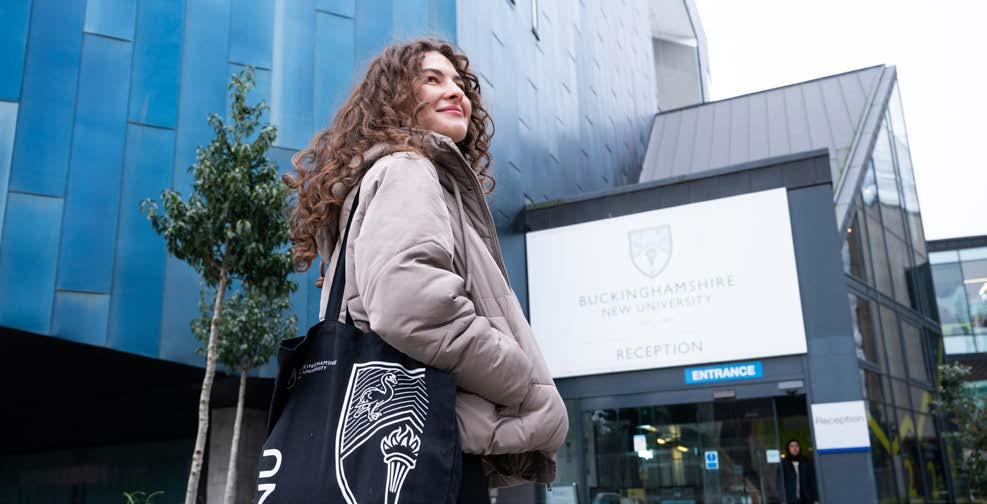
We conducted our audit in accordance with International Standards on Auditing (UK) (“ISAs (UK)”) and applicable law. Our responsibilities are described below. We have fulfilled our ethical responsibilities under, and are independent of the Group in accordance with, UK ethical requirements including the FRC Ethical Standard. We believe that the audit evidence we have obtained is a sufficient and appropriate basis for our opinion.
The Council has prepared the financial statements on the going concern basis as it does not intend to liquidate the Group or the University or to cease their operations, and as it has concluded that the Group and the University’s financial position means that this is realistic. It has also concluded that there are no material uncertainties that could have cast significant doubt over their ability to continue as a going concern for at least a year from the date of approval of the financial statements (“the going concern period”).
In our evaluation of the Council’s conclusions, we considered the inherent risks to the Group’s business model and analysed how those risks might affect the Group and University’s financial resources or ability to continue operations over the going concern period.
Our conclusions based on this work:
• we consider that the Council’s use of the going concern basis of accounting in the preparation of the financial statements is appropriate;
• we have not identified, and concur with the Council’s assessment that there is not, a material uncertainty related to events or conditions that, individually or collectively, may cast significant doubt on the Group or the University’s ability to continue as a going concern for the going concern period.
However, as we cannot predict all future events or conditions and as subsequent events may result in outcomes that are inconsistent with judgements that were reasonable at the time they were made, the above conclusions are not a guarantee that the Group or the University will continue in operation.
Fraud and breaches of laws and regulations – ability to detect
Identifying and responding to risks of material misstatement due to fraud
To identify risks of material misstatement due to fraud (“fraud risks”) we assessed events or conditions that could indicate an incentive or pressure to commit fraud or provide an opportunity to commit fraud. Our risk assessment procedures included:
• Enquiring of directors, the Audit Committee, internal audit and inspection of policy documentation as to the Group’s high-level policies and procedures to prevent and detect fraud, including the internal audit function, and the Group’s channel for “whistleblowing”, as well as whether they have knowledge of any actual, suspected or alleged fraud.
• Reading Council and Audit Committee minutes.
• Using analytical procedures to identify any unusual or unexpected relationships.
• Reviewing fraud and whistleblowing reports provided to the Audit Committee.
We communicated identified fraud risks throughout the audit team and remained alert to any indications of fraud throughout the audit.
As required by auditing standards, we perform procedures to address the risk of management override of controls, in particular the risk that Group management may be in a position to make inappropriate accounting entries and the risk of bias in accounting estimates such as pension assumptions. On this audit we do not believe there is a fraud risk related to revenue recognition because the majority of the Group’s revenue is made of revenue
from tuition fees. This revenue is made up of a large volume of lowvalue transactions, meaning that there is minimal opportunity to commit a material fraud. In particular, a very large number of false entries to student data would be required for a material fraud in tuition fee revenue. Furthermore there is limited ability to manipulate fees arising from partner-taught courses due to the very low value of commission fee income receivable per student.
We did not identify any additional fraud risks.
We performed procedures including:
• Identifying journal entries and other adjustments to test for all full scope components based on risk criteria and comparing the identified entries to supporting documentation. These included those posted by individuals who seldom post journals.
• Assessing whether the judgements made in making accounting estimates are indicative of a potential bias.
Identifying and responding to risks of material misstatement related to compliance with laws and regulations
We identified areas of laws and regulations that could reasonably be expected to have a material effect on the financial statements from our general commercial and sector experience, through discussion with the directors and other management (as required by auditing standards), and from inspection of the Group’s regulatory and legal correspondence and discussed with the directors and other management the policies and procedures regarding compliance with laws and regulations.
We communicated identified laws and regulations throughout our team and remained alert to any indications of non-compliance throughout the audit.
The potential effect of these laws and regulations on the financial statements varies considerably.
Firstly, the Group is subject to laws and regulations that directly affect the financial statements including financial reporting legislation (including related higher education legislation), taxation legislation, pensions legislation, and higher education financial reporting related regulation and we assessed the extent of compliance with these laws and regulations as part of our procedures on the related financial statement items.
Secondly, the Group is subject to many other laws and regulations where the consequences of non-compliance could have a material effect on amounts or disclosures in the financial statements, for instance through the imposition of fines or litigation or the loss of the Group’s license to operate. We identified the following areas as those most likely to have such an effect: fraud, corruption and bribery legislation, money laundering regulations, health and safety legislation, data protection legislation, and compliance with regulatory requirements of the Office for Students and UK Visas and Immigration, recognising the nature of the Group’s activities. Auditing standards limit the required audit procedures to identify non-compliance with these laws and regulations to enquiry of the directors and other management and inspection of regulatory and legal correspondence, if any. Therefore if a breach of operational regulations is not disclosed to us or evident from relevant correspondence, an audit will not detect that breach.
We have reported separately on the University’s use of funds in the section of our audit report dealing with other legal and regulatory requirements.
Context of the ability of the audit to detect fraud or breaches of law or regulation
Owing to the inherent limitations of an audit, there is an unavoidable
risk that we may not have detected some material misstatements in the financial statements, even though we have properly planned and performed our audit in accordance with auditing standards. For example, the further removed non-compliance with laws and regulations is from the events and transactions reflected in the financial statements, the less likely the inherently limited procedures required by auditing standards would identify it.
In addition, as with any audit, there remained a higher risk of nondetection of fraud, as fraud may involve collusion, forgery, intentional omissions, misrepresentations, or the override of internal controls. Our audit procedures are designed to detect material misstatement. We are not responsible for preventing non-compliance or fraud and cannot be expected to detect noncompliance with all laws and regulations.
The Council is responsible for the other information, which comprises the information included in the Financial Statements other than the financial statements and our auditor’s report thereon. Our opinion on the financial statements does not cover the other information and, accordingly, we do not express an audit opinion or any form of assurance conclusion thereon.
Our responsibility is to read the other information and, in doing so, consider whether, based on our financial statements audit work, the information therein is materially misstated or inconsistent with the financial statements or our audit knowledge. Based solely on that work, we have not identified material misstatements in the other information.
As explained more fully in its statement set out on page 52, the Council is responsible for: the preparation of the financial statements and for being satisfied that they give a true and fair view; such internal control as it determines is necessary to enable the preparation of financial statements that are free from material misstatement, whether due to fraud or error; assessing the Group and parent University’s
ability to continue as a going concern, disclosing, as applicable, matters related to going concern; and using the going concern basis of accounting unless it either intends to liquidate the Group or the parent University or to cease operations, or has no realistic alternative but to do so.
Our objectives are to obtain reasonable assurance about whether the financial statements as a whole are free from material misstatement, whether due to fraud or error, and to issue our opinion in an auditor’s report. Reasonable assurance is a high level of assurance, but does not guarantee that an audit conducted in accordance with ISAs (UK) will always detect a material misstatement when it exists. Misstatements can arise from fraud or error and are considered material if, individually or in aggregate, they could reasonably be expected to influence the economic decisions of users taken on the basis of the financial statements.
A fuller description of our responsibilities is provided on the FRC’s website at www.frc.org.uk/ auditorsresponsibilities
We are required to report on the following matters by the Accounts Direction dated 25 October 2019 issued by the Office for Students (‘the Accounts Direction’).
In our opinion, in all material respects:
• funds from whatever source administered by the Group or the University for specific purposes have been properly applied to those purposes and managed in accordance with relevant legislation;
• funds provided by the Office for Students, UK Research and Innovation (including Research England), the Education and Skills Funding Agency and the Department for Education have been applied in accordance with the relevant terms and conditions; and
• the financial statements meet the requirements of the Accounts Direction dated 25 October 2019 issued by the Office for Students.
Matters on which we are required to report by exception
We are required by the Accounts Direction to report to you where the University has an access and participation plan that has been approved by the Office for Students’ director of fair access and participation and the results of our audit work indicate that the Group’s and the University’s expenditure on access and participation activities for the financial year disclosed in Note 7b has been materially misstated.
We are also required by the Accounts Direction to report to you where the results of our audit work indicate that the Group’s and the University’s grant and fee income, as disclosed on page 65 of the financial statements has been materially misstated.
We have nothing to report in these respects.
THE PURPOSE OF OUR AUDIT WORK AND TO WHOM WE OWE OUR RESPONSIBILITIES
This report is made solely to the Council in accordance with paragraph 12(2) of the University's Articles of Government and section 124B of the Education Reform Act 1988. Our audit work has been undertaken so that we might state to the Council those matters we are required to state to them in an auditor’s report and for no other purpose. To the fullest extent permitted by law, we do not accept or assume responsibility to anyone other than the University and the Council for our audit work, for this report, or for the opinions we have formed.
for and on behalf of KPMG LLP, Statutory Auditor Chartered Accountants
15 Canada Square London E14 5GL
15 December 2023
The Council is responsible for preparing the Financial Statements in accordance with the requirements of the Office for Students’ Terms and Conditions of Funding for Higher Education Institutions and Research England’s Terms and Conditions of Research England Grant and applicable law and regulations.
It is required to prepare the group and parent University financial statements in accordance with UK accounting standards and applicable law (UK Generally Accepted Accounting Practice), including FRS 102 The Financial Reporting Standard applicable in the UK and Republic of Ireland. The Terms and Conditions of Funding further require the financial statements to be prepared in accordance with the requirements of the Accounts Direction dated 25 October 2019 issued by the Office for Students (‘the Accounts Direction’) and the 2019 Statement of Recommended Practice – Accounting for Further and Higher Education.
The Council is required to prepare financial statements which give a true and fair view of the state of affairs of the group and of the parent University and of their income and expenditure, gains and losses and changes in reserves, and of the Group’s cash flows for that period. In preparing each of the group and parent University financial statements, the Council is required to:
• select suitable accounting policies and then apply them consistently;
• make judgements and estimates that are reasonable and prudent;
• state whether applicable UK accounting standards and the 2019 Statement of Recommended Practice – Accounting for Further and Higher Education have been followed, subject to any material departures disclosed and explained in the financial statements;
• assess the group and parent University’s ability to continue as a going concern, disclosing, as applicable, matters related to going concern; and
• use the going concern basis of accounting unless it either intends to liquidate the group or the parent University or to cease operations, or have no realistic alternative but to do so.
The Council is responsible for keeping adequate accounting records that are sufficient to show and explain the parent University’s transactions and disclose with reasonable accuracy at any time the financial position of the parent University. It is responsible for such internal control as it determines is necessary to enable the preparation of financial statements that are free from material misstatement, whether due to fraud or error, and has general responsibility for taking such steps as are reasonably open to it to safeguard the assets of the group and to prevent and detect fraud and other irregularities.
The Council is also responsible for ensuring that:
• funds from whatever source administered by the Group or the University for specific purposes have been properly applied to those purposes and managed in accordance with relevant legislation;
• funds provided by the Office for Students, UK Research and Innovation (including Research England) and the Education and Skills Funding Agency and the Department for Education have been applied in accordance with the terms and conditions attached to them;
• ensuring that there are appropriate financial and management controls in place to safeguard public funds and funds from other sources; and
• securing the economical, efficient and effective management of the University’s resources and expenditure.
The Council is responsible for the maintenance and integrity of the corporate and financial information included on the University’s website. Legislation in the UK governing the preparation and dissemination of financial statements may differ from legislation in other jurisdictions.

Year ended 31 July 2023
All items of income and expenditure relate to continuing activities.
Accompanying notes and policies on pages 58 to 85 form part of these financial statements.
Year ended 31 July 2023
Accompanying notes and policies on pages 58 to 85 form part of these financial statements.
Year ended 31 July 2023
Provisions
Accompanying notes and policies on pages 58 to 85 form part of these financial statements.
Restated to separate our intangible assets from fixed assets.
The financial statements were approved by the Governing Body on 15 December 2023 and were signed on its behalf on that date by:
Professor Nick Braisby Vice-Chancellor and Chief Executive
Maggie Galliers CBE Chair of Council and Pro-Chancellor
Year ended 31 July 2023
The University has taken advantage of the exemption under paragraph 1.12 of FRS102 for qualifying entities from preparing its own cash flow statement.
Accompanying notes and policies on pages 58 to 85 form part of these financial statements.
The country of incorporation of Buckinghamshire New University is the United Kingdom.
The following accounting policies have been applied consistently in dealing with items which are considered material in relation to the financial statements.
The functional currency used in the preparation of the financial statements is GBP Sterling.
These financial statements have been prepared in accordance with the statement of recommended practice ‘SORP: Accounting for Further and Higher Education Institutions 2019’,the requirements of the OfS’s accounts direction (issued June 2018) and in accordance with the FRS 102 Accounting Standards. The University is a public benefit entity and therefore applies the relevant public benefit requirement of FRS102.
The financial statements are prepared under the historical cost convention modified by the revaluation of certain fixed assets.
The Group and parent University’s activities, together with the factors likely to affect its future development, performance and position, are set out in the Strategic Report which forms part of the Council’s Report. The Council’s Report also describes the financial position of the Institution, its cash flows, liquidity position and borrowing facilities.
The financial statements have been prepared on a going concern basis which the Council consider to be appropriate for the following reasons.
The Council has prepared cash flow forecasts for a period of 12 months from the date of approval of these financial statements (the going concern period). which indicate that,
taking account of severe but plausible downsides, the Group and parent University will have sufficient funds to meet their liabilities as they fall due for that period.
In reaching this conclusion, the Council has considered a severe but plausible downside scenario, accounting for potential changes to the higher education funding regime and uncertainty over future price inflation; as well as suitable and plausible mitigating actions including cost controls.
The Council believe the Group and parent University have sufficient funding in place and expect the Group to be in compliance with its debt covenants even in severe but plausible downside scenarios.
Consequently, the Council is confident that the Group and parent University will have sufficient funds to continue to meet their liabilities as they fall due for at least 12 months from the date of approval of the financial statements and therefore have prepared the financial statements on a going concern basis.
The consolidated financial statements include the University and its subsidiaries for the financial year to 31 July 2023. The results of subsidiaries acquired or disposed of during the period are included in the Consolidated Statement of Comprehensive Income and Expenditure from the date of acquisition or up to the date of disposal. Intra-group transactions are eliminated on consolidation.
The consolidated financial statements do not include the income and expenditure of the Students' Union as the University does not exert control or dominant influence over policy decisions.
Joint ventures and investments in associates are accounted for using the equity method.
Income from the sale of goods or services is credited to the Consolidated Statement of Comprehensive Income and Expenditure when the goods or services are supplied to the external customers or the terms of the contract have been satisfied.
Fee income for the University and its partners is stated gross of any expenditure which is not a discount and credited to the Consolidated Statement of Income and Expenditure over the period in which students are studying. For courses starting in September / October, the assumption is that the course is completed within the academic / financial year. For courses starting between January and July the course is assumed to start from the first day of the following month. Where the amount of the tuition fee is reduced, by a discount for prompt payment, income receivable is shown net of the discount. Bursaries and scholarships are accounted for gross as expenditure and not deducted from income.
Investment income is credited to the Statement of Consolidated Income and Expenditure on a receivable basis.
Funds the University receives and disburses as paying agent on behalf of a funding body are excluded from the income and expenditure of the University where the University is exposed to minimal risk or enjoys minimal economic benefit related to the transaction.
The University has adopted the accrual model for government revenue grants.
Government revenue grants including funding council block grant and research grants are recognised in income over the periods in which the University recognises the related costs for which the grant is intended to compensate. Where part of a government grant is deferred it is recognised as deferred income within creditors and allocated between creditors due within one year
and due after more than one year as appropriate.
Grants (including research grants) from non-government sources are recognised as income when the University is entitled to the income and performance related conditions have been met. Income received in advance of performance related conditions being met is recognised as deferred income within creditors on the balance sheet and released to income as the conditions are met.
Government capital grants are recognised in income over the expected useful life of the asset using the accruals method of accounting. Other capital grants are recognised in income when the University is entitled to the funds subject to any performance related conditions being met.
Non exchange transactions without performance related conditions are donations and endowments. Donations and endowments with donor imposed restrictions are recognised in income when the University is entitled to the funds. Income is retained within the restricted reserve until such time that it is utilised in line with such restrictions at which point the income is released to general reserves through a reserve transfer.
Donations with no restrictions are recognised in income when the University is entitled to the funds.
Investment income and appreciation of endowments is recorded in income in the year in which it arises and as either restricted or unrestricted income according to the terms or other restriction applied to the individual endowment fund.
There are four main types of donations and endowments identified within reserves:
1. Restricted donations - the donor has specified that the donation must be used for a particular objective.
2. Unrestricted permanent endowments
- the donor has specified that the fund is to be permanently invested to generate an income stream for the general benefit of the University.
3. Restricted expendable endowments
- the donor has specified a particular objective other than the purchase or construction of tangible fixed assets, and the University has the power to use the capital.
4. Restricted permanent endowments
- the donor has specified that the fund is to be permanently invested to generate an income stream to be applied to a particular objective.
Expenditure on Research and Development is written off to the Consolidated Statement of Comprehensive Income and Expenditure in the year in which it is incurred.
The University has a five-year rolling long-term maintenance plan, which forms the basis of the ongoing maintenance of the estate. The cost of long term and routine corrective maintenance is charged to the Consolidated Statement of Comprehensive Income and Expenditure as incurred for work and is not capital in nature.
Transactions in foreign currencies are translated to the respective functional currencies of Group entities at the foreign exchange rate ruling at the date of the transaction. Monetary assets and liabilities denominated in foreign currencies at the balance sheet date are translated to the functional currency at the foreign exchange rate ruling at that date. Foreign exchange differences arising on translation are recognised in Surplus or Deficit. Non-monetary assets and liabilities that are measured in terms of historical cost in a foreign currency are translated using the exchange rate at the date of the transaction. Non-monetary assets and liabilities denominated in foreign currencies that are stated at fair value are retranslated to the functional currency at foreign exchange rates ruling at the dates the fair value was determined.
Retirement benefits for most employees of the University are provided by either the Teachers’ Pension Scheme (TPS) or the Local Government Pension Scheme (LGPS). Some retirement benefits are
provided by Universities Superannuation Scheme (USS) and Scottish Widows Scheme. The TPS, LGPS and USS schemes are defined benefit schemes which are externally funded and contracted out of the State Second Pension (S2P). Scottish Widows is a defined contribution plan.
The USS and TPS are multi-employer schemes for which it is not possible to identify the assets and liabilities to the University as members due to the mutual nature of the schemes and therefore these schemes are accounted for as defined contribution retirement benefit schemes.
A liability is recorded within provisions for any contractual commitment to fund past deficits within the USS scheme.
Defined benefit plans are postemployment benefit plans other than defined contribution plans. Under defined benefit plans, the University’s obligation is to provide the agreed benefits to current and former employees, and actuarial risk (that benefits will cost more or less than expected) and investment risk (that returns on assets set aside to fund the benefits will differ from expectations) are borne, in substance, by the University. The Group should recognise a liability for its obligations under defined benefit plans net of plan assets. This net defined benefit liability is measured as the estimated amount of benefit that employees have earned in return for their service in the current and prior periods, discounted to determine its present value, less the fair value (at bid price) of plan assets. The calculation is performed by a qualified actuary using the projected unit credit method. Where the calculation results in a net asset, recognition of the asset is limited to the extent to which the University is able to recover the surplus either through reduced contributions in the future or through refunds from the plan.
A defined contribution plan is a postemployment benefit plan under which the company pays fixed contributions into a separate entity and will have no legal or constructive obligation to pay further amounts. Obligations for contributions to defined contribution pension plans are recognised as an expense in the Consolidated Statement of Comprehensive Income and Expenditure in the periods during which services are rendered by employees.
Short term employment benefits such as salaries and compensated absences are recognised as an expense in the year in which the employees render service to the University. Any unused benefits are accrued and measured as the additional amount the University expects to pay as a result of the unused entitlement. Termination benefits are recognised as an expense in the year an employee's contract of employment is terminated.
Fixed assets are stated at cost less accumulated depreciation and accumulated impairment losses. Certain items of fixed assets that had been revalued to fair value on or prior to the date of transition to the 2019 FE HE SORP, are measured on the basis of deemed cost, being the revalued amount at the date of that revaluation.
Depreciation is provided to write off the cost or valuation less the estimated residual value of the tangible fixed assets by equal instalments over their useful economic life as follows:
Core - 50 to 80 years; Roofs – 40 years; Finishes – 30 years;
Fixtures and fittings – 20 years; Mechanical and electrical – 30 years;
Refurbishments of freehold buildings –30 years;
Refurbishments of leasehold buildings –over the remaining period of the lease; Minor capital works – 5 years;
Equipment - 5 to 15 years;
Operating lease buyouts – over the remaining useful life of the underlying assets No depreciation is provided on freehold land
a. Land and buildings - The University's buildings are specialised buildings and therefore it is not appropriate
to value them on the basis of open market value. Land and buildings inherited from the Local Education Authority (LEA) are held in the balance sheet at deemed cost. Other land and buildings are included in the balance sheet at cost. Freehold land is not depreciated as it is considered to have an indefinite useful life.
A review for impairment of a fixed asset is carried out annually for assets with an anticipated useful economic life in excess of 50 years. The useful life of all assets is reviewed if events or changes in circumstances indicate that the carrying amount of the fixed asset may not be recoverable.
b. Buildings - Buildings under construction are accounted for at cost, based on the value of architects’ certificates and other direct costs, including associated finance costs, incurred to 31st July. No depreciation is charged on assets in the course of construction.
c. Equipment - Equipment, including computers and software, costing less than £5,000 per individual item is recognised as expenditure. All other equipment is capitalised. Capitalised equipment is depreciated over its useful economic life.
Where equipment is acquired with the aid of specific grants it is capitalised and depreciated in accordance with the above policy, with the related grant being credited to a deferred capital grant account and released to Consolidated Statement of Comprehensive Income and Expenditure over the expected useful economic life of the related equipment.
Intangible fixed assets are stated at cost less accumulated amortisation and accumulated impairment losses. Amortisation is provided to write off the cost or valuation less the estimated residual value of the intangible fixed assets by equal instalments over their useful economic life.
Investments in subsidiary undertakings are recognised at cost less provision for impairment losses.
Stock is held at the lower of cost and net realisable value, and is measured using a fair valuation method. Educational stock is not material in relation to the University finances and is therefore charged to the Consolidated Statement of Comprehensive Income and Expenditure when purchased.
The University is an exempt charity within the meaning of schedule 3 of the Charities Act 2011 (formerly schedule 2 of the Charities Act 1993) and as such within the meaning of paragraph 1 of schedule 6 to the Finance Act 2010. Accordingly, the University is potentially exempt from taxation in respect of income or capital gains received within categories covered by sections 478 to 488 of the Corporation Taxes Act 2010 (formerly enacted in section 505 of the Income and Corporation Taxes Act 1988), or section 256 of the Taxation of Chargeable Gains Act 1992 to the extent that such income or gains are applied to exclusively charitable purposes.
The University receives no similar exemption in respect of Value Added Tax. Irrecoverable VAT on inputs is included in the costs of such inputs. Any irrecoverable VAT allocated to fixed assets is included in their cost.
The University’s subsidiary companies are subject to corporation tax and VAT in the same way as any commercial organisation.
Cash includes cash in hand, deposits repayable on demand and overdrafts. Deposits are repayable on demand if they are in practice available within 24 hours without penalty.
Cash equivalents are short term, highly liquid investments that are readily convertible to known amounts of cash with insignificant risk of change in value.
Short term investments comprise bank deposits which are not repayable within 24 hours.
Provisions are recognised in the financial statements when:
a. the University has a present obligation (legal or constructive) as a result of a past event;
b. it is probable that an outflow of economic benefits will be required to settle the obligation; and
c. a reliable estimate can be made of the amount of the obligation.
The amount recognised as a provision is determined by discounting the expected future cash flows at a pre- tax rate that reflects risks specific to the liability.
A contingent liability arises from a past event that gives the University a possible obligation whose existence will only be confirmed by the occurrence or otherwise of uncertain future events not wholly within the control of the University. Contingent liabilities also arise in circumstances where a provision would otherwise be made but either it is not probable that an outflow of resources will be required or the amount of the obligation cannot be measured reliably.
A contingent asset arises where an event has taken place that gives the University a possible asset whose existence will only be confirmed by the occurrence or otherwise of uncertain future events not wholly within the control of the University.
Contingent assets and liabilities are not recognised in the Balance Sheet but are disclosed in the notes.
Funds the institution receives and disburses as paying agent on behalf of a funding body or other body, where the institution is exposed to minimal risk or enjoys minimal economic benefit related to the receipt and subsequent disbursement of the funds, are excluded from the Consolidated Statement of Comprehensive Income and Expenditure of the institution.
The University only has financial assets and liabilities of a kind that qualify as basic financial instruments. They are initially recognised at transaction value and subsequently measured at their settlement value, as follows:
- Cash – cash held
- Debtors – settlement amount after any discounts
- Creditors – settlement after any trade discounts
- Loans – amortised cost
- Finance leases – amortised cost
Leases in which the University assumes substantially all the risks and rewards of ownership of the leased asset are classified as finance leases. Leased assets acquired by way of finance lease and the corresponding lease liabilities are initially recognised at an amount equal to the lower of their fair value and the present value of the minimum lease payments at inception of the lease.
Minimum lease payments are apportioned between the finance charge and the reduction of the outstanding liability. The finance charge is allocated
to each period during the lease term so as to produce a constant periodic rate of interest on the remaining balance of the liability.
Costs in respect of operating leases are charged on a straight-line basis over the lease term. Any lease premiums or incentives are spread over the minimum lease term.
Borrowing costs are recognised as expenditure in the period in which they are incurred.
The University accounts for its share of joint ventures using the equity method.
The University accounts for its share of transactions from joint operations and jointly controlled assets in the Consolidated Statement of Income and Expenditure.
The University accounts for its investments in associates under the equity method.
Reserves are classified as restricted or unrestricted.
Other restricted reserves include balances where the donor has designated a specific purpose and therefore the University is restricted in the use of these funds.

The following accounting judgements are considered critical in applying the University’s accounting policies:
The University applies judgment in determining the agency/principal relationship with its franchise partners. Where the University is exposed to the majority of the benefits and risks of the relationship the University considers itself to be acting as a principal and the student income is recognised on a gross basis. Where the University is not exposed to the majority of the benefits and risks of the relationship the University considers itself to be acting as an agent and the income is recognised on a net basis.
The primary factors that the University considers indicative when determining whether or not it is exposed to the majority of the benefits and risks of the relationship are:
1. A direct relationship with the Student Loan Company for the tuition fees of the students.
2. A direct relationship with the Office for Students for the teaching grants of the students.
3. A direct relationship with HESA for the students number return for those students.
4. The University having full contractual responsibility for teaching out the students if the partner fails.
5. The University bearing the risk of investment in the development of the course programmes which it designs as well as the inventory risk.
6. The University controlling the price of all courses charged to students.
The University is a third member of Chiltern Student Villages Ltd (CSV), a charitable company whose objects include the advancement of education through the provision of housing and associated services to students of
the University and other educational institutions.
During 2016-17 the University completed the sale of its student accommodation to CSV as part of a wider refinancing arrangement with an alternative finance provider. This resulted in the University committing to an operating rental lease of the buildings on the site from Aviva as part of the transaction for a period of 30 years.
In the arrangements that exist above management have considered two key items in reviewing the application of appropriate accounting treatment:
1. Whether or not the University has control over CSV – it is concluded that management has no control over CSV as it is obliged to act within its objects which are not exclusively for the benefit of students of the University, Charity’s trustees are bound by charity law to act within the objects of CSV regardless of who appoints them. The University also holds a minority of CSV board members. The University does have the right to remove the bank from CSV; however doing so would cause a significantly adverse commercial impact on the entity that this would never take place in practice.
2. Whether the arrangement with Aviva is an operating or finance lease – it has been concluded by management that the arrangement is an operating lease because at the end of the arrangement there is no beneficial financial arrangements with regards to continuing with the lease or the purchase of the asset. The life of the asset is 53 years as opposed to the length of the lease which is 30 years and the NPV of the minimum lease payments is significantly lower than the deemed value of the asset.
The University has bad debt provisions in respect of student, partnership, commercial and research debts. The bad debt provision is calculated on a specific basis according to where the student or student sponsor is in the debt collection cycle with a general provision calculated
for remaining debtors with regards to the ageing of the debt to provide for balances which may prove irrecoverable. Balances over 211 days overdue are provided for fully, balances between 181 and 210 days overdue are provided for at a rate of 50% and balances between 151 and 180 days overdue are provided for at a rate of 25%. The specific provision takes into consideration the debtors’ engagement with the University, whether their account has been placed with an external collector, whether it is awaiting legal action and whether there is an agreed payment plan in place.
Debt deemed to be uncollectable during the year is written off to the Consolidated Statement of Income and Expenditure.
FRS 102 requires that certain assumptions are made in order to determine the amount to be recorded for retirement benefit obligations and pension plan assets for certain of the University’s defined benefit plans. These are mainly actuarial assumptions such as discount rate, mortality rates and expected inflation rates. In determining the appropriate assumptions, the University has regard to various external sources, including as provided by actuaries.
Differences arising from actual experience or future changes in assumptions will be reflected in future years. The key assumptions made for 2021 are included in note 26.
As a result of the significant gains arising from the change in financial assumptions, the net balance of the University's funded defined benefit obligation has changed from a deficit to a surplus position at the reporting date. At the balance sheet date, forward looking minimum funding contributions, based on current contribution rates, are higher than the forward-looking service cost, based on balance sheet date market conditions. On the assumption that these rates continue into the future, no surplus is recognisable.
Year ended 31 July 2023
1
Full time Home and EU students includes £115,918k for 2022-23 and £98,573k for 2021-22 for students recruited through partners.
Year ended 31 July 2022
Note
The source of grant and fee income, included in notes 1 to 3 is as follows:
a) Number of staff with a full-time equivalent basic salary of over £100,000 per annum
£115,000 - £119,999
£120,000 - £124,999
£140,000 - £144,999
£145,000 - £149,999
£150,000 - £154,999
£155,000 - £159,999
£160,000 - £164,999
£165,000 - £169,999
£170,000 - £174,999
£175,000 - £179,999
£180,000 - £184,999
£185,000 - £189,999
£190,000 - £194,999
£195,000 - £199,999
£200,000 - £204,999
£205,999 – £209,999
£210,000 - £214,999
£215,000 - £219,999
£220,000 - £224,999
£225,000 - £229,999
Year ended 31 July 2023
b) Remuneration Package of the Head of Provider (Vice-Chancellor)
i) Basic Salary
ii) Payment of dividends
iii) Performance related pay and other bonuses including amount waived or deferred payment arrangements
iv) Pension contributions and payments in lieu of pension contributions
v) Salary sacrifice arrangements
vi) Compensation for loss of office
vii) Any sums paid under any pension scheme in relation to employment with the provider
viii) Other taxable benefits
ix) Non-taxable benefits
x) Other remuneration
Prof Nick Braisby (2022-23)
*
Prof Nick Braisby (2021-22)
*
*A salary increase of £24,870 is deferred and has been accrued for in the 2022/23 Financial Statements. Payment of this sum, will be made to the Vice-Chancellor on 31 July 2025 provided that his performance remained satisfactory throughout the intervening period. The total accumulation as at 31 July 2023 (from 2019/20 onwards) is £113,196.
**The VC opted out of the pension scheme in January 23 therefore the first figure is his pension cost until this date and the second figure is the cash supplement he received in lieu of pension contributions.
c) Justification for the total remuneration package for the head of provider (Professor Nick Braisby)
The Chair of Council undertakes the Vice-Chancellor and Chief Executive Officer’s annual Performance and Development Review (PDR) against an agreed set of objectives, both institutional and personal, which were reviewed periodically during the year. The overall conclusion from the review for 2022/23 was that the VC had met and his objectives during another challenging year.
The VC’s remuneration has been benchmarked and found to be appreciably below what would be expected for an institution of comparable income. Because of this, and the VC’s sustained and continued positive performance, the VC Remuneration Committee decided to increase the base pay for the VC from 2021. The Committee has agreed that the shortfall between the vice chancellor’s salary and benchmark will be made up over four years, and the accumulated difference between his remuneration and the benchmark remuneration will be paid at the end of that period thus bringing the Vice-Chancellor’s remuneration in line with the market for future years. This arrangement has been formally documented and approved by the VC Remuneration Committee.
d) Relationship between head of provider’s remuneration and that for all other employees
The UCEA report pay ratio/multiple between the head of provider’s remuneration and the median salary for staff remains at 5.9 (not yet revised by UCEA for this year). This is based on information provided by the Universities & Colleges Employers Association (UCEA) which uses HESA data (academic staff only). The pay ratio/multiple including all staff as calculated using the University’s Payroll data is 6.2
Year ended 31 July 2023
e) Severance payments
a. Disclosures about all staff
i) Loss of office
ii) Loss of any other office connected with the provider’s affairs
iii) Loss of any other office connected with the affairs of a parent or subsidiary undertaking of the provider
b. Disclosures about the head of provider (Professor Nick Braisby)
i) Loss of office
ii) Where compensation paid includes benefits
iii) Where compensation paid includes additional pension payments
Average staff numbers by major category
None
None
None
Not applicable
Not applicable
Key management personnel
Key management personnel are those persons having authority and responsibility for planning, directing and controlling the activities of the University. Staff costs includes compensation paid to key management personnel.
The key management personnel at the University are its senior management team which is headed up by the Vice Chancellor and during this financial year has comprised the Deputy Vice Chancellor, the Pro-Vice Chancellor Education and Digital, the ProVice Chancellor (Student Experience), the Chief Finance Officer, the Commercial and Business Development Director and the University Secretary and Clerk to Council.
The University council members are the trustees for charitable law purposes. Due to the nature of the University's operations and the compositions of the Council, being drawn from local public and private sector organisations, it is inevitable that transactions will take place with organisations in which a member of the Council may have an interest. All transactions involving organisations in which a member of Council may have an interest, including those identified below, are conducted at arms length and in accordance with the University's Financial Regulations and usual procurement procedures. In 2022-23 transactions of this nature totalled £26,180 (2021-22 £25,800).
No council member has received any remuneration/waived payments from the group during the year (2022 - none).
The total expenses paid to or on behalf of three council members was £1,126 (2022 - £983). This represented travel and subsistence expenses incurred in attending Council, Committee meetings and Charity events in their official capacity.
Year ended 31 July 2023
7 Analysis of
Academic and related expenditure includes £94,138k for 2022-23 and £80,384k for 2021-22 for the costs of tuition of students recruited through partners.
Note on staff costs
All staff costs of £186k are also included in the overall staff cost figure (ref: Note 6).
Note on partners
Investment by sub-contractual partners is included in the statement. This information is provided by the partners and combined with spend for Bucks ‘taught’ students. This spend is incurred directly by the partners and does not appear in the accounts of BNU.
Year ended 31 July 2023
Context
Of our full-time, home undergraduate entrants in 2022-23,
- 32% were from the two lowest participation quintiles [28%]
- 60% were from the two most disadvantaged quintiles [44%]
- 23% of young entrants were eligible for free school meals at KS4 [18%]*
- 85% were mature [29%]
- 18% were Black [8%]
- 13% were Asian [18%]
- 12% were an other ethnic minority [8%]
[Sector data in brackets- source OfS APP dashboard, 2021-22 latest data available; All other data internal Student Activity Dashboard, FTE, November 2022]
Access investment
BNU spent £116,728 and sub-contractual partners £125,378 on Access and Outreach (total: £242,106).
At Bucks, 4,200 school pupils engaged in over 260 events:
- 35% were potential first-generation in HE
- 33% were from an ethnic minority group
- 32% came from high deprivation areas
- 51% came from areas of low participation in higher education
- 27% received free school meals
- 54 were service children
- 49 were care-experienced
With the COVID-19 recovery in progress we were able to increase our support to students from year groups 6 to 13 , delivering more than 1,800 hours of engaging in-person and blended activities throughout the year, including campus-based tours and workshops; course tasters; virtual CV and UCAS support; mock interviews and portfolio reviews. The team also provided parental support and teacher CPD sessions.
"Our Futures Days campus visits are aimed at Year 9/10 students, offering a first-hand experience of university life to encourage them to consider higher education, irrespective of their background. Last year we held 22 Futures Days which were offered to all local schools which meet our WP criteria. Feedback showed these days helped changed the mindset of many students who are now considering university having previously thought this was not a viable option. For older age groups, we support both their move into further education and their application to higher education. We offer special on campus taster days collaborating with course academics. We actively seek to recruit Student Ambassadors who attended our target WP schools to provide relatable role models to the school pupils with whom we work."
BNU spent £439,465 and sub-contractual partners spent £332,381 on support for disabled students (total: £771,846).
BNU spent £106,879 and sub-contractual partners spent £40,128 on research and evaluation of access and participation activity (total: £147,007).
"There has been ongoing embedded investment in business intelligence and evaluation capability during 2022/23. One manager and one analyst in the strategic planning team partially support the evaluation of attainment raising activity, awareness raising activity and manage associated business intelligence. The figure also includes HEAT membership. The Quality Enhancement group includes School Directors of Education in each of our seven schools, as well as colleagues from relevant professional services. This group has been pivotal to increasing the visibility of outcome gaps. It supports a refreshed approach to Annual Monitoring in which Schools account for outcome gaps and respond with actions which feed into the strategic and business planning process. It is also leading on identifying priorities for our next APP due to be submitted Spring 2024."
Year ended 31 July 2023
The types of financial support available in 2022/23 were as set out in our five-year plan (2020-2024).
"BNU spent £924,083 and sub-contractual partners spent £569,589 on financial support for students (total: £1,493,672)."
"Bucks ‘taught’ students: Bursaries: £565,400; Hardship Fund: £169,534; Bucks Future Success Package (books and equipment grant): £181,310."
11 UK domiciled students from underrepresented groups received bursaries:
- 1,058 BNU Student Success Bursary; - 74% were an ethnic minority - 52% were from the two most deprived quintiles
- 36 Care leaver bursary;
- 33 Estranged student bursary;
- 8 GRTSB bursary. 82 UK domiciled students received support from the BNU hardship fund.
551 UK domiciled students received support from the BNU hardship fund.
Hardship spend is countable for all students, but of recipients:
- 69% were an ethnic minority [BNU taught demographic 61%]
- 21% had a declared disability [BNU taught demographic 21%]
- 46% were from the two most deprived quintiles [BNU taught demographic 33%]
UCFB students: £249,110 funded bursary or scholarships.
"We are currently in a teach out arrangement with UCFB. In 2022/23 we only had Level 6 students with smaller cohorts than in our APP projection. As such, the UCFB spend on financial support, attributable to our registered students at this partner is lower than projected in our original APP and this was re-reprofiled in our Variation."
Other partners spent £320,479 on financial support.
8 Interest and other finance costs
Sub-contractual partners have spent more than was originally profiled in our APP.
The cost of living crisis led to increased demand for BNU’s financial support offer and budget was increased.
Inflation has increased the cost of running Outreach activity. Commitment to research and evaluation has been increased in readiness for the new APP agenda.
Year ended 31 July 2023
Year ended 31 July 2022
9 Taxation
As explained in the accounting policies, the University is potentially exempt from taxation because of its charitable status and no taxation on income or capital gains is payable for 2022-23 or 2021-22.
10 Intangible Fixed Assets
Year ended 31 July 2023
At 31 July 2023, freehold land and buildings included £14.45m (2022 £14.45m) in respect of freehold land and is not depreciated.
At 31 July 2023, freehold land and buildings included £54.74m (2022 - £55.14m) held under charge by Barclays Bank in respect of the loan detailed in note 18.
Year ended 31 July 2023
Group and University fixtures, fittings and equipment include assets held under finance leases as follows:
12 Non-Current Investments
non-current investments consist of :
(Conferences)
BCUC (Conferences) Limited Provision for Loss - Dormant (886)
Within the capital and reserves of BCUC (Conferences) Limited is £628k of called up share capital in BCUC (Services) Limited.
Chiltern Student Villages Limited, a charitable company, is an associated entity of the University accounted for under the equity method. The cost and carrying amount of the investment at 31 July 2023 was nil (2022: £nil). Chiltern Student Villages Limited is a company limited by guarantee and has no shareholders and makes no distribution to its members. As such, in the year ended 31 July 2023 the University's share of the associate charitable company's result is nil (2022: £nil). 13 Investment in
Amounts falling due within one year:
Year ended 31 July 2023
17 Creditors: amounts falling due within one year
Deferred income
Included with accruals and deferred income are the following items of income which have been deferred until specific performance related conditions have been met.
18 Creditors: amounts falling due after more than one year
The obligation to fund the past deficit on the Universitys' Superannuation Scheme (USS) arises from the contractual obligation with the pension scheme for total payments relating to benefits arising from past performance. Management have assessed future employees within the USS scheme and salary payment over the period of the contracted obligation in assessing the value of this provision.
The assumptions for calculating the provision for the obligation to fund the deficit for the USS scheme are:
Year ended 31 July 2023
Analysis of secured and unsecured loans:
Year ended 31 July 2023
20 Restricted Reserves 22 Capital and other commitments Provision has not been made for the following capital commitments:
Consolidated reserves with restrictions represent scholarships and bursaries and are as follows:
Year ended 31 July 2023
23 Lease obligations
Total rentals payable under operating leases:
The operating lease commitments primarily relate to the rents payable for the student accommodation buildings Windsor House and Hughenden Student Villages.
Total rentals payable under finance leases:
The finance lease commitments relate primarily to the Aylesbury campus building and land.
24 Contingent liabilities
There were no contingent liabilities as at 31 July 2023 or 31 July 2022.
25 Subsidiary undertakings
The subsidiary companies (all of which are registered in England & Wales), wholly-owned or effectively controlled by the University, are as follows:
Missenden Abbey Limited A hotel and management training complex
BCUC (Conferences) Limited Dormant
BCUC (Services) Limited Dormant
Thames Valley Training & Development Ltd Dormant
Buckinghamshire Education and Skills Training Dormant
Different categories of staff are eligible to join one of two main schemes at the University:
• Teachers’ Pension Scheme (TPS); for academic employees
• Local Government Pension Scheme (LGPS); for non-academic employees
There are a very small number of academic employees who are also part of the Universities Superannuation Scheme (USS).
These schemes are defined benefit schemes contracted out of the State Second Pension (S2P), the assets of which are held in separate trustee administered funds. These are funded by contributions from the University and employees and the accounts reflect the cost of providing these benefits.
If the University ever closes and there is no successor establishment, the Secretary of State becomes the compensating authority.
The Teachers’ Pension Scheme (TPS) is a statutory, contributory, defined benefit scheme, governed by the Teachers’ Pension Scheme Regulations 2014. These regulations apply to teachers in schools and other educational establishments, including universities. Membership is automatic for teachers and lecturers at eligible institutions. Teachers and lecturers are able to opt out of the TPS.
Although members may be employed by various bodies, their retirement and other pension benefits are set out in regulations made under the Superannuation Act (1972) and Public Service Pensions Act (2013) and are paid by public funds provided by Parliament. The TPS is an unfunded scheme and members contribute on a ’pay as you go‘ basis – these contributions, along with those made by employers, are credited to the Exchequer under arrangements governed by the above Act. Retirement and other pension benefits are paid by public funds provided by Parliament.
Under the definitions set out in FRS 102 (28.11), the TPS is a multi-employer pension plan. The University is unable to identify its share of the underlying assets and liabilities of the plan.
Accordingly, the University has taken advantage of the exemption in FRS 102 and has accounted for its contributions to the scheme as if it were a definedcontribution plan.
The valuation of the TPS is carried out in line with regulations made under the Public Service Pension Act 2013. Valuations credit the teachers’ pension account with a real rate of return assuming funds are invested in notional investments that produce that real rate of return.
The latest actuarial review of the TPS was carried out as at 31 March 2016. The valuation report was published by the Department for Education in April 2019. The valuation reported total scheme liabilities (pensions currently in payment and the estimated cost of future benefits) for service to the effective date of £218 billion, and notional assets (estimated future contributions together with the notional investments held at the valuation date) of £196 billion giving a notional past service deficit of £22 billion.
As a result of the valuation, new employer contribution rates were set at 23.68% of pensionable pay from September 2019 onwards (compared to 16.48% during 2018/19). Whilst the Department for Education has agreed to pay a teacher pension employer contribution grant to cover the additional costs during the 202021 academic year for schools, it has not provided equivalent funding to the Higher Education Sector.
A full copy of the valuation report and supporting documentation can be found on the Teachers’ Pension Scheme website.
The employer’s contributions to the Teachers’ Pension Scheme is £3,535,233 in 2022-23 (2021-22: £2,904,233).
Year ended 31 July 2023
The institution participates in Universities Superannuation Scheme. The assets of the scheme are held in a separate trusteeadministered fund. Because of the mutual nature of the scheme, the assets are not attributed to individual institutions and a scheme-wide contribution rate is set. The institution is therefore exposed to actuarial risks associated with other institutions’ employees and is unable to identify its share of the underlying assets and liabilities of the scheme on a consistent and reasonable basis. As required by Section 28 of FRS 102 “Employee benefits”, the institution therefore accounts for the scheme as if it were a defined contribution scheme. As a result, the amount charged to the profit and loss account represents the contributions payable to the scheme. Since the institution has entered into an agreement (the Recovery Plan) that determines how each employer within the scheme will fund the overall deficit, the institution recognises a liability for the contributions payable that arise from the agreement (to the extent that they relate to the deficit) with related expenses being recognised through the profit and loss account.
The total write back to the profit and loss account is £193,000 (2021-22 charge of £288,000) as shown in note 6.
Deficit recovery contributions due within one year for the institution are £8,000 (prior year: £22,000).
The latest available complete actuarial valuation of the Retirement Income Builder is as at 31 March 2020 (the valuation date) and was carried out using the projected unit method.
Since the institution cannot identify its share of USS Retirement Income Builder (defined benefit) assets and liabilities, the following disclosures reflect those relevant for those assets and liabilities as a whole.
The 2020 valuation was the sixth valuation for the scheme under the scheme-specific funding regime introduced by the Pensions Act 2004, which requires schemes to have sufficient and appropriate assets to cover their technical provisions. At the valuation date, the value of the assets of the scheme was £66.5 billion and the value of the scheme’s technical provisions was £80.6 billion indicating a shortfall of £14.1 billion and a funding ratio of 83%.
The key financial assumptions used in the 2020 valuation are described below. More detail is set out in the Statement of Funding Principles.
CPI assumption
Pension increases (subject to a floor of 0%)
Discount rate (forward rates)
Term dependent rates in line with the difference between the Fixed Interest and Index Linked yield curves less:
1.1% p.a. to 2030, reducing linearly by 0.1% p.a. to a long-term difference of 0.1% p.a. from 2040
CPI assumption plus 0.05%
Fixed interest gilt yield curve plus:
Pre-retirement: 2.75% p.a.
Post retirement: 1.00% p.a.
The main demographic assumptions used relate to the mortality assumptions. These assumptions are based on analysis of the scheme’s experience carried out as part of the 2020 actuarial valuation. The mortality assumptions used in these figures are as follows:
2020 valuation
Mortality base table
Future improvements to mortality
101% of S2PMA “light” for males and 95% of S3PFA for females
CMI 2019 with a smoothing parameter of 7.5, an initial addition of 0.5% p.a. and a long-term improvement rate of 1.8% pa for males and 1.6% pa for females
Year ended 31 July 2023
The current life expectancies on retirement at age 65 are:
A new deficit recovery plan was put in place as part of the 2020 valuation, which requires payment of 6.2% of salaries over the period 1 April 2022 until 31 March 2024, at which point the rate will increase to 6.3%. The 2023 deficit recovery liability reflects this plan. The liability figures have been produced using the following assumptions:
The Local Government Pension Scheme (LGPS) is a defined benefit statutory scheme administered in accordance with the Local Government Pension Scheme Regulations 2013 and currently provides benefits based on career average revalued earnings. The administering authority for the Fund is Buckinghamshire County Council.
The Local Government Pension Scheme is valued every three years by a professionally qualified independent actuary using the projected unit method, the rates of contribution payable being determined by the trustees on the advice of the actuary. The next actuarial valuation of the Fund will be carried out as at 31 March 2025 and will set contributions for the period from 1 April 2026 to 31 March 2029.
The table below summarises the minimum employer contributions due from the University to the Fund during this inter-valuation period. The employer may pay further amounts at any time but, following the actuarial valuation of the fund as at 31 March 2022, no secondary rate payments to help fund a potential deficit on cessation on of the scheme are due.
To assess the value of the Employer’s liabilities at 31 July 2023, the value of the liabilities calculated for the funding valuation as at 31 March 2022 have been rolled forward, using financial assumptions that comply with FRS102.
Asset values are reported using estimated asset allocations calculated at each triennial valuation as at 31 March 2023, and thereafter the valuations are rolled forward for accounting valuation purposes.
To calculate the asset share the actuary has rolled forward the assets allocated to the Employer as at 31 March 2022 allowing for investment returns, contributions paid into and estimated benefits paid from the Fund by and in respect of the Employer and its employees. The estimated asset allocation for Buckinghamshire New University as at 31 July 2023 is £84.695m (31 July 2022 £84.451m)
The pension scheme assets are held in a separate trustee-administered fund to meet long-term pension liabilities to current and former employees. The trustees are required to act in the best interests of the fund’s beneficiaries. The trustees are responsible for setting the investment strategy for the scheme in consultation with professional advisers.
An amount of £174,000 (2022: £172,000) was paid directly by the University in respect of supplementary pension entitlements of employees taking early retirement at the time of incorporation. The pension liability associated with this commitment is valued in line with the assumptions for the LGPS in the sections below.
Assumptions used in calculating the schemes liabilities under FRS102
Financial assumptions
The financial assumptions used to calculate the results are in the table below.
These assumptions are set with reference to market conditions at 31 July 2023.
The estimate of the employer’s past service liability duration is 22 years. The discount rate is the annualised yield at the 22 year point on the Merrill Lynch AA-rated corporate bond yield curve which has been chosen to meet the requirements of FRS102 and with consideration of the duration of the Employer’s liabilities.
Demographic assumptions
The current mortality rates allow for a long-term rate of improvement in life expectancy of 1.25% p.a. The assumed life expectations from 65 are as below:
in 20 years:
Scheme assets and expected rate of return
The return on the Fund (on a bid value to bid value basis) for the year to 31 July 2023 is estimated to be (0.82)%. The actual return on Fund assets over the year may be different. During each annual reporting period between triennial valuations, asset returns are estimated using 11 months of market experience and one month of extrapolation being assumed.
Management have relied on the fund administrators to calculate return on the investments which are made based on systematic investment plan prepared by the Buckinghamshire LGPS. There is therefore inherent estimation uncertainty in the value of the fund assets at 31 July 2023 given that the asset values are rolled forward from the latest reporting year of the fund, allowing for investment returns (estimated where necessary), contributions paid into, and estimated benefits paid from, the fund, by and in respect of the University and its employees. A change of 1% in the asset value would increase / decrease the valuation of the University's pension fund asset by £847k.
Based on the estimated asset allocation, the Employer’s share of the assets of the Fund is approximately 2.25%.
Year ended 31 July 2023
The estimated asset allocation for Buckinghamshire New University as at 31 July 2023 is as follows:
Re-measurements in other comprehensive income:
Negative
Year ended 31 July 2023
Reconciliation of the movement of the present value of the defined benefit obligation:
Analysis of the movement in the fair value of scheme assets:
History of experience gains and losses:
The University has elected not to restate prior year amounts as permitted by FRS102.The employer contributions to the scheme for the year to 31 July 2023 is £2,970,000.
As a result of the significant gains arising from the change in financial assumptions, the net balance of the University's funded defined benefit obligation has changed from a deficit to a surplus position at the reporting date. At the balance sheet date, forward looking minimum funding contributions, based on current contribution rates, are higher than the forward-looking service cost, based on balance sheet date market conditions. On the assumption that these rates continue into the future, no surplus is recognisable.
Year ended 31 July 2023
The following table sets out a sensitivity analysis on the major assumptions which have been used in the above calculations:
Year ended 31 July 2023
Certain members of the Council are associated with other organisations that may from time to time undertake transactions with the University or its subsidiaries. All such transactions are undertaken on an arm’s length basis and in accordance with the University’s normal terms. No member of the Council has any financial interest in such transactions, nor is such other organisations related parties of the University or its subsidiaries.
As all subsidiary undertakings are wholly owned, the University has taken advantage of the exemption contained in FRS 102 and has therefore not disclosed transactions or balances with entities which form part of the group.
The following payments were made to or received from organisations in which two of the University's Board of Governors and Advisors have a material role and / or controlling interest:
Year to 31 July 2023 Year to 31 July 2022
No other transactions were identified which require disclosure under FRS 102, Section 33, ‘Related Party Disclosures’.
The University is a member of Chiltern Student Villages Ltd. There is no controlling party. The charitable company was set up in July 2008 for the transfer, development, provision and management of student accommodation at the University.
Bucks Students’ Union is an independent organisation largely funded by the University. During the 2022-23 financial year the Union was in receipt of £1.921m (2021-22 £1.662m) of grant funding from the University. At 31 July 2023, the University had a creditor with the Students’ Union of £nil and a debtor of £nil.

The following table is provided solely in satisfaction of the university’s obligations to facilitate access to US federal financial aid as required by the US Department of Education, and has been prepared and presented in-line with their specific requirements. All figures presented are based upon FRS 102 recognition and measurement principles, in line with the statement of accounting policies, and are presented in GBP. It is not advised that it be used for any other purpose and all values within it can be found elsewhere within these financial statements.
The schedules set out how each amount disclosed has been extracted from the financial statements. As set out above, the accounting policies used in determining the amounts disclosed are not intended to and do not comply with the requirements of accounting principles generally accepted in the United States of America. Year ended 31 July 2023
Year ended 31 July 2023
Year ended 31 July 2023

Maggie Galliers CBE Independent Chair and Pro-Chancellor Appointed 1 August 2021
Irene Kirkman Independent Appointed 1 August 2016
Steve Kennett Co-opted Appointed 1 January 2022
Sadie Groom Independent Appointed 1 August 2021
Jackie Westaway Independent Appointed 1 August 2021
Anthony Murphy Independent Appointed 1 August 2015
Dr Susan Rosser Independent Appointed 1 August 2016
John Smith Independent Appointed 1 August 2015
Supriya Sobti Independent Appointed 1 August 2019
Andy Cole OBE Independent Appointed 1 August 2019
Annet Gamell Independent Appointed 1 August 2019
Karen Satterford Independent Appointed 1 August 2020
Anna Crabtree Independent Appointed 1 August 2017
Justin Sullivan Independent Appointed 1 August 2022
Danielle Akerman Co-opted member (student) Appointed 1 August 2022
Professor Nick Braisby
Vice-Chancellor and Chief Executive
Professor Karen Buckwell-Nutt Elected Senate Member Appointed 1 August 2022
Professor Paul Morgan Senate Chair’s Nomination to Honorary Awards Committee
Emma Binnie Elected Professional Services Employee Appointed 1 August 2020
Ze’ev Portner
Academic Staff (elected) Appointed 1 August 2021
Hillary Mullen Academic Staff (elected) Appointed 1 December 2021
Charlotte Leighton-Woods President, BNU Students' Union Term of office commenced 1 July 2022
Professor Nick Braisby
Vice-Chancellor and Chief Executive
Professor Rachel Cragg Pro Vice-Chancellor, Education and Digital
Professor Paul Morgan Pro Vice-Chancellor, Student Experience
Trevor Gabriele Chief Finance Officer
Ellie Smith
University Secretary and Clerk to the Council
Ian Harper Commercial and Business Development Director
High Wycombe Campus
Queen Alexandra Road
High Wycombe
Buckinghamshire HP11 2JZ
Aylesbury Campus
59 Walton Street
Aylesbury
Buckinghamshire HP21 7QG
Uxbridge Campus
106 Oxford Road
Uxbridge
Middlesex
UB8 1NA
BNU based at Pinewood Studios
Pinewood Studios
Pinewood Road
Iver Heath
Buckinghamshire SL0 0NH
Missenden Abbey
London Road
Great Missenden
Buckinghamshire HP16 0BD
Telephone: 0330 123 2023
Email: advice@bnu.ac.uk
@BuckinghamshireNewUniversity
@ _BNUni
@ _BNUni
@_BNUni